






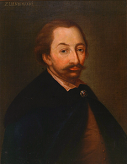

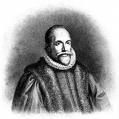
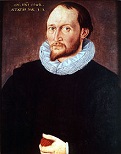
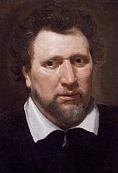



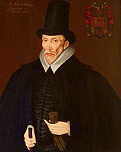
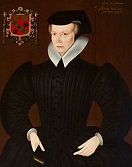



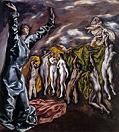
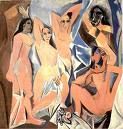
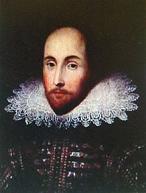
1610 Total pop. of the Am. colonies of Britain is only 350 this year. On Jan. 3-6 the Nossa Senhora da Graca Incident at the mouth of Nagasaki Bay in Japan sees samurai Arima clan junks attack the richly-laden Portuguese carrack Nossa Senhora da Graca (Madre de Deus) (known as the "black ship"), meeting fanatical resistance ending when Capt. Andre Pessoa sets the gunpowder store on fire, demolishing the ship and destroying the crew but denying them the cargo. On Feb. 10 the new German Catholic League meets in Wurzburg to decide on its org., funding, and arming, with HRE Ferdinand II and Pope Paul V approving it; too bad, Maximilian I considers it a strictly defensive union, and refuses to become a Hapsburg puppet and tool, causing him to eventually resign in 1616. On Mar. 12 after receiving a letter from American Roman Catholic priest Father Sandoval as to the legality of slavery of African blacks, Brother Luis Brandaon writes a letter in reply, with the soundbyte: "We have been here ourselves for forty years and there have been among us very learned Fathers... Never did they consider the trade as illicit. Therefore we and the Fathers of Brazil buy these slaves for our service without any scruple." By spring the Starving Time (begun 1609) ends, with only 60 Jamestown colonists surviving, reduced to cannibalism, "their bodies shrunk down almost to the skeleton, resembling corpses held upright by unseen marionette strings", and after English supply ships arrive, the First Thanksgiving is celebrated - can you say Cenozoic? On Apr. 10 the Treaty of Bruzolo (Brussol) allies Charles Emmanuel I of Savoy with Henri IV of France to remove the Spanish from Italy; too bad, the assassination of Henri IV causes it to be dropped. On May 14 in the midst of war preparations against Holland, French king (since 1589) Henri (Henry) IV (b. 1553) is assassinated (stabbed) in his carriage in crowded traffic in the Rue de la Ferronnerie in Paris by raving maniac Jesuit-reject teacher Francois Ravaillac (b. 1578) (who claims that an invasion of Holland is a war against the pope) (Jesuit intrigue is suspected, and Juan de Mariana's 1599 "De Rege et Regis Institutione", which advocates the assassination of heretic kings is blamed and publicly burned), and his 9-y.-o. son Louis XIII (1601-43) succeeds him as Bourbon king #2 of France (until May 14, 1643) under the regency (until 1614) of his Huguenot-hating mother Marie (Maria) de' Medici (1575-1642); Italian adventurer Concino Concini, Count della Penna, Marquis and Marechal d'Ancre (1575-1617) replaces the duke of Sully as chief minister, who is allowed to remain master of the artillery with care of the woods and given a 300K livre reward, which causes him to soon retire to his estate (to smell the flowers?); Louis' three Bourbon daughters Elizabeth, Christina, and Henrietta Maria end up married into the royal families of Spain, Savoy, and England; on May 27 raving Ravaillac, who had been tortured in vain to make him give up any accomplices is taken to the Place de Greve, scalded with burning sulfur, molten lead, and boiling oil and resin, his flesh torn by pincers, then finally drawn and quartered - what is the tablecloth for? In May interim Gov. Thomas Gates arrives in Jamestown from Bermuda, finds the starved remnant begging to give up and get out of Dodge, and in June they start down the James River, and are surprised to meet new gov. and capt.-gen. of Va. (appointed in Feb.) Thomas West, 3rd Baron de la Warr (1577-1618) (Lord Delaware) as he arrives with three ships and 150 men; after he persuades them to turn around and return, they go on to found the settlement of Henrico (Richmond) upstream of Jamestown at the falls, plus two more settlements downstream at the mouth of the James River; life is tough but they hang on with military discipline and strict martial law, with penalties for running away incl. shooting, burning, hanging, and breaking on the wheel. Henry Hudson (b. 1566) makes his Fourth Voyage in search of a Northwest Passage, sailing through the Hudson Strait and discovering Hudson (Hudson's) Bay and the Hudson River; too bad, the crew mutinies and returns to England after setting Henry, his son and several others adrift in Hudson Bay on June 22, and they are never seen again. On July 4 the Battle of Klushino (Kluszyn) near Klushino village (near Smolensk) in Poland is a V for 6.5K outnumbered Polish Hussars and their brilliant cavalry under Stanislaw Zolkiewski (b. 1547), over 30K Russians and 5K mercentaries under Dmitry Shuisky. False Dmitri II is killed; the Poles invade Russia, capture Moscow, and depose Tsar (since 1606) Vasily IV Shuisky, and on July 19 Zygmunt III Vasa's son Wladyslaw IV Vasa (1595-1648) is declared Russian tsar by the Seven Boyars (until Feb. 21, 1613), but his daddy Sigismund III Vasa nixes it after a popular uprising, although he keeps the title of grand duke of Muscovy until 1634; the town of Smolensk holds out. In Oct. French super scholar Isaac Casaubon (1559-1614) comes to England, where he is warmly received by James I, and ends up spending the rest of his life conversing with him or working at royal orders on a refutation of the "Annals of Baronius" (1558-1607), working himself to death. On Dec. 2 after six arrests and four exiles, persistent Welsh Catholic Benedictine monk-priest (St.) John Roberts (b. 1575) is arrested by the stankin' English govt. while celebrating Mass, taken to Newgate prison in his vestments, then hanged, drawn and quartered in Tyburn on Dec. 10 for the crime of priestly ministering, becoming a Roman Catholic martyr. In Prussia Sept. 2 follows Aug. 22 as the Gregorian calendar is adopted. James I prorogues Parliament, but it reassembles; James I's eldest son Prince Henry is created Prince of Wales. Arbella Stewart (Arbella Stuart) (1575-1615), pretender to the English throne (cousin of James I) is imprisoned in the Tower for marrying William Seymour, 2nd Duke of Somerset (1587-1660), like Elizabeth I warned her not to do in 1602 - another anti-female conspiracy? English and Dutch settlers skirmish in India. Frederick IV dies, and is succeeded by his son Frederick (Friedrich) V (1596-1632) (future Winter King) as elector palatine of the Rhine. John Guy becomes the first gov. of Cuper's Cove in Newfoundland, the 2nd oldest English colony in the New World after Jamestown (first proprietary governor). Dr. Bonham's Case, decided by English chief justice Sir Edward Coke establishes the principle of judicial review of legislative acts, with the soundbyte "In many cases the common law will control acts of Parliament and sometimes adjudge them to be utterly void; for when an Act of Parliament is against common right or reason, or repugnant, or impossible to be performed, the common law will control it and adjudge such Act to be void." Russian Cossacks begin conquering Siberia while exploring the coasts and rivers (until 1648), reaching the mouth of the Yenisey River this year, which in 1619 is set as Russia's E border; C Siberia is a tougher nut and takes 30+ years. The town of Derry (Gael. "Daire"/"Doire" = oak grove) on the W bank of the Foyle River in County Donegal at the S end of Inishowen Peninsula (modern-day pop. 83K/90K) is separated from County Donegal and combined with County Coleraine and parts of County Antrim and County Tyrone to form County Londonderry, with the city resettled by planters sent by London livery cos., who rebuild the town with high walls in 1613-19 and rename it Londonderry, becoming the first planned city in Ireland, its grid pattern later copied by the colonies of British North Am.; after it is sieged 3x in the 17th cent. and its walls never breached, it becomes known "the Maiden City"; in the late 20th cent. the unionists want to keep the name Londonderry, but the nationalists want to call it Derry, causing it to be called "the Stroke City" (Derry/Londonderry) by local broadcaster Gerry Anderson. A Portuguese settlement is founded at Cape Coast (Cabo Corso) 100 mi. W of Accra on the Gulf of Guinea, home of the Fante (Fanti) people. Santa Fe (founded 1605) is declared the capital of New Mexico by the Spanish. The Dutch East India Co. introduces the term "share"; a ship brings lacquer furniture to Holland, creating a demand for it; making use of the route info. from the 1596 book by Jan Huyghen van Linschoten, a Dutch ship brings the first bale of green tea leaves to Amsterdam from Macao, after which the Dutch scramble to get into the tea trade. English playwright Ben Jonson (1572-1637) gives up Roman Catholicism, which he had converted to (feigned?) in 1598 during his imprisonment for killing actor Gabriel Spencer. St. Francis de Sales and Mme. de Chantal found the Order of the Nuns of the Visitation of Mary. Wadham College at Oxford U. is founded by Nicholas Wadham (1532-1609) and his widow Dorothy Wadham (nee Petre) (1535-1618) of Somerset; she becomes the first female non-royal non-aristocrat to found a college at Oxbridge; the college bldg., designed by William Arnold becomes the last English public bldg. built according to the medieval tradition of the master mason; alumni incl. Sir Christopher Wren. Madeleine de Sainte-Beuve (1655-1733) endows an Ursuline house in Paris. The town of Rajkot is founded in Saurashtra, India. The first printing press is established in Lebanon in Dayr Qazhaya under Fakhr al-Din II; its first pub. is the Book of Psalms in Syriac. The English Book of Common Prayer is trans. into Manx, becoming the first written Manx lit. Lord Percy pays 10 shillings to visit Bethlehem Royal Hospital for the insane in London, becoming the first known public visit. Architecture: The Grand Galerie in the Louvre (begun 1595) is finished, becoming the longest indoor corridor in the world; Henri IV likes to fill it with trees, grass, and rocks, and stage fox hunts in it? Wollaton Hall (begun 1580) in England is finished. The Ottoman imperial-style Mosque of Malika (Queen) Safiya in Cairo near the Citadel is begun (finished 1611). Science: On Jan. 7 Galileo sights four of Jupiter's moons (Ganymede, Io, Europa, Callisto), calling them the Medician Stars after the Medicis; by the end of the year he observes the Phases of Venus, becoming the first direct evidence for the Copernican Theory, which he waits until 1613 to pub. After beating Galileo by 4 mo. and making the first drawing of the Moon through a telescope on July 26, 1609, English astronomer Thomas Harriot (1560-1621) discovers sunspots - you're the cream in my coffee? French astronomer Nicolas-Claude Fabri de Pieresc (1580-1637) discovers the Orion Nebula. Music: Michael Praetorius (1571-1621), Musae Sioniae (1,244 church hymns). Lodovico Grossi da Viadana (1560-1627), Symphonies. Art: Anon., Cobbe Portrait of William Shakespeare; owned by Anglican archbishop of Dublin Charles Cobbe (1686-1765); once attributed to artist Cornelis Janssens van Ceulen (1593-1661); several copies are made with different hairlines, all the way from bald to prime of life; really Sir Thomas Overbury?; ends up in the Folger Shakespeare Library. Lodovico Carracci (1555-1619), Angel Freeing Souls from Purgatory. El Greco (1541-1614), The Opening of the Fifth Seal (1610-14); the vision of St. John; phantasmagorical pigmentation and tortuously elongated figures mix Byzantine and Western and channel Cubism and Expressionism?; used by Picasso as a basis for his 1907 "Les Demoisselles d'Avignon"? Peter Paul Rubens (1577-1640), The Raising (Elevation) of the Cross (1610-11). Carlo Saraceni 1579-1620), The Holy Spirit Descending on Pope Gregory I; later used to bolster and/or illustrate papal infallibility. Nonfiction: Anon., Exemplar of Korean Medicine (Tongui Pogam); a compendium of 2 cents. of writings on herbal medicines. Jacobus Arminius (1560-1609), The Five Articles of the Remonstrants; a statement of Arminianist free will beliefs against Calvinist predestination is presented to the states of Holland Friesland; major Remonstrants incl. Simon Episcopius and Jan Uytenbogaert; too bad, in 1618-9 the Synod of Dordrecht gets them expelled, desposed, and/or banished, and they set up an exile community in Antwerp in 1619, followed in 1621 in Schleswig, where they build the town of Friedrichstadt. Johann Arndt (1555-1621), True Christianity; Lutheran pietism; "But since the world, which thou art to strive against, is not without thee, but within thee, it follows, that it is also to be conquered not without, but within thee"; "Consider then, O man! whether there can be anything more wretched and poor, more naked and miserable, than man when he dies, if he be not clothed with Christ's righteousness, and enriched in his God"; "In short, all things that please the natural man in this world, are, to a true Christian, only so many crosses and temptations, allurements of sin and snares of death, that continually exercise his virtue". Jean Beguin (1550-1620), Tyrocinium Chymicum (Beginner's Chemistry) (Paris)/ the first chemistry textbook. St. Augustine of Hippo (354-430), City of God; first pub. in English. Cardinal Robert Bellarmine (1542-1621), On the Power of the Supreme Pontiff in Temporal Affairs. John Donne (1572-1631), Pseudo-Martyr; argues that English Roman Catholics should takes an oath of allegiance to James I. Galileo Galilei (1564-1642), Siderial (Starry) Messenger (Sidereus Nuncius); the first pub. look at the sky through a telescope, bolstering the Copernican theory with its description of the mountains on the Moon and the four satellites of Jupiter ("sideria Medicea"), a mini-model of Copernicus' Solar System; he also discovers sunspots, and uses them to estimate the rate of the Sun's rotation, which really freaks out the Aristotelians, who believe in the immutability of the "perfect" heavenly bodies; next year Johannes Kepler coins the word "satellite", from the Latin word for assistant. John Speed, Theatrum Imperii Magnae Britanniae (maps). Novels: Gines Perez de Hita (1545-1619), The Civil Wars of Granada. Plays: Francis Beaumont (1584-1616) and John Fletcher (1579-1625), The Maid's Tragedy. John Fletcher (1579-1625), The Faithful Shepherdess (pastoral drama). Ben Jonson (1572-1637), The Alchemist (comedy); a satire on the follies, vanities, and vices of mankind; his best comedy?; after Lovewit flees his home in London to avoid the plague, his butler turns it into a con game HQ, becoming Captain Farce and hiring conman Subtle and ho Doll Common; marks incl. Dapper, Drugger, Sir Epicure Mammon, Mammon, and Ananias the Anabaptist. William Shakespeare (1564-1616), The Tragedy of Cymbeline, King of Britain (1610-1) (comedy); Cymbeline, Celtic king of Britain and his queen, Posthumous and Imogen, Pisanio, Cloten, Belarius, Guiderius (Polydore), Arviragus (Cadwal), Iachimo; "Hath his bellyful of fighting" (2.1.24); "Hark! hark! the lark at heaven's gate sings" (2.3.22); "The game is up" (3.3.107); "Slander,/ Whose edge is sharper than the sword" (3.4.35); "I have not slept one wink" (3.4.103). Poetry: Samuel Daniel (1562-1619), Tethys' Festival or the Queenes Wake; written on the occasion of Prince Henry becoming a knight of the Bath. Giles Fletcher the Younger (1586-1612), Victory and Triumph (allegory). Births: English mathematician John Pell (d. 1685) on Mar. 1 in Southwick, Sussex; educated at Trinity College, Cambridge U. Italian pope (1689-91) Alexander VIII (Pietro Vito Ottoboni) (d. 1691) on Apr. 22 in Venice; educated at the U. of Padua; last to use the name Alexander until ?. French burlesque poet-dramatist-novelist Paul Scarron (d. 1660) (AKA Monsieur Scarron) on July 1 in Paris; husband (1652-) of Madame de Maintenon; becomes severely crippled in 1638. English shipbuilder Peter Pett (d. 1672) on Aug. 6 in Deptford; son of Phineas Pett (1570-1647). French Jesuit missionary (St.) Gabriel Lalemant (d. 1649) on Oct. 3 in Paris; feast day: Sept. 26/Oct. 19. Irish Protestant soldier-statesman lt.-gen. James FitzThomas Butler, 12th Earl and 1st Duke of Ormonde (d. 1688) on Oct. 19 in Clerkwell, London; of the Old English Butler family that has dominated SE Ireland since the 12th cent.; raised a Roman Catholic until his daddy dies in 1619, then is made a ward of Archbishop George Abbott of Canterbury, who turns him into a Protestant; husband (1629-) of Lady Elizabeth Preston; father of Thomas Butler, 6th earl of Ossory (1634-80); created duke of Ormonde in 1683. Flemish painter David Teniers the Younger (d. 1690) on Dec. 15 in Antwerp; son of David Teniers the Elder (1582-1649); father of David Teniers III (1638-85). French historian Charles du Fresne, Sieur du Cange (Ducange) (d. 1688) on Dec. 18 in Amiens. British MP (1640-2) and secy. of state (1642-3) Lucius Cary, 2nd Viscount Falkland (d. 1643); son of Sir Henry Cary, 1st viscount Falkland (1575-1633); educated at St. John's College, Cambridge U., and Trinity College, Dublin; founder of the Great Tew Circle. Dutch Frisian adm. Joris Pieters van den Broeck (d. 1652). French natural philosopher Jacques Alexandre Le Tenneur (d. 1660) in Paris. English witchhunter John Stearne (d. 1670) in Lawshall (near Bury St. Edmonds); collaborator of French mathematician-scientist Gilles Personne de Roberval (d. 1675). Dutch painter-engraver Adriaen van Ostade (d. 1685) in Haarlem; elder brother of Isaac van Ostade (1621-49); father is from Ostade near Eindhoven; pupil of Frans Hals and Rembrandt. French Calvinist naval officer Abraham Duquesne, Marquis du Bouchet (d. 1688) in Dieppe. Deaths: English master of the revels Edmund Tylney (b. 1536). English archibishop of Canterbury (1604-10) Richard Bancroft (b. 1544) on Nov. 2 in Lambeth, London. English Jesuit leader Robert Persons (b. 1545) on Apr. 15 in Rome. Italian Catholic missionary (to China) Matteo Ricci (b. 1552). French king (1589-1610) Henri IV (b. 1553) on May 14 in Paris (murdered). French fortifications engineer Jean Errard (b. 1554). Italian painter Michelangelo Caravaggio (b. 1571) on July 18 in Porto Ercole, Tuscany. Welsh Benedictine monk St. John Roberts (b. 1575) on Dec. 10 in Tyburn, England (martyred). German landscape painter Adam Elsheimer (b. 1578) on Dec. 11 in Rome, Italy.
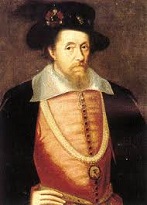











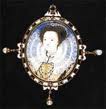
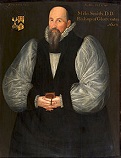
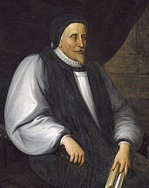
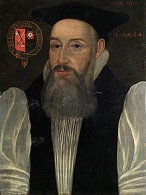
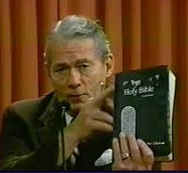

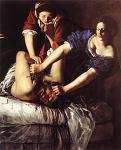
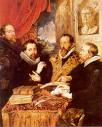
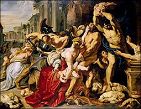


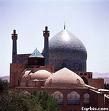
1611 On Mar. 4 London bishop (since 1609) George Abbott (1562-1633) becomes archbishop of Canterbury (until Aug. 5, 1633), and soon gets into a struggle with William Laud, who is elected pres. of St. John's College, Oxford. On Apr. 28 Spanish Dominicans found the U. of Santo Tomas in the Philippines, becoming the oldest univ. in Asia to survive to modern times. On May 9 Japanese emperor (since 1586) Go-Yozei (b. 1572) abdicates in favor of his son Go-Mizunoo (1596-1680), who becomes Japanese emperor #108 (until 1629). In May Sir Thomas Dale (-1619) becomes acting gov. of the struggling Va. colony, and establishes the strict Lawes Divine, Moral and Martiall (Dale's Code); in Aug. Thomas Gates succeeds him as gov. On June 23 Christian II (b. 1583) dies, and his younger brother Johann Georg (John George) I (1585-1656) succeeds as elector of Protestant Saxony (until Oct. 8, 1656), going on to at first flirt with the Hapsburgs and the Catholic League in order to counter the growing strength of Brandenburg and the Palatinate, and end up seeing Saxony's role as a great power in Europe become kaput by the end of his long reign. On Oct. 30 Charles IX (b. 1550) dies, and his son Gustavus II Adolphus II (Gusav II Adolf) Wasa (1594-1632) is elected king of Sweden (until Nov. 6, 1632), inheriting the Swedish-Russian War; he makes Axel Oxenstierna (1583-1654) his chancellor, and issues a royal charter giving the council and estates a voice in all questions of legislation, plus a veto power in all matters of war and peace, and modernizes the govt. and courts while sponsoring education, commerce and industry, and foreign immigration. On Nov. 11 after the family of reclusive oddball HRE (since 1576) Rudolf II (1552-1612) fears that his insanity and incapacity to rule are making the empire vulnerable to Protestant takeover, and names his brother and heir Archduke Matthias as head of the House of Hapsburg, regent, and king of Bohemia, and Matthias takes an army to Prague to force him, Rudolf resigns the Bohemian crown on Nov. 11. Real life vamp gets off like O.J.? On Dec. 29 Hungarian countess ("the Blood Lady of Cachtice") Elizabeth (Erzsebet) (Erzsébet) Bathory (Báthory) de Ecsed (1560-1615), wife of Gen. Ferencz Nadasdy, who lives in Cachtice (Csejthe) Castle in the Carpathian Mts. of Slovakia is arrested on orders of Hungarian king Matthias II; her castle is found to contain scores of bodies of young girls hanging from chains in the dungeons; she is convicted of murdering 50, and her accomplices executed, but since she is of noble birth they wall her in a tiny room in her castle and feed her tiny food scraps until she dies on Aug. 21, 1614; she thought that bathorying in fresh blood would preserve her Liz-like youth and beauty, and killed hundreds (650?) in 1585-1609 after torturing them? - so that's what gives me bad vibes about the Gabor sisters? James I dissolves Parliament, and institutes the baronetage as a means of raising money to bail himself out financially - plop plop fizz fizz, oh what a relief it is? Denmark-Norway begins the Calmar (Kalmar) War with Sweden (ends 1613), breaking 40 years of peace for Sweden, capturing the Swedish frontier fortresses of Kalmar and Alvsborg. Arbella Stewart escapes from the Tower of London, and is recaptured. Lord de la Warr returns from Va. to England, where he writes an account of the colony in order to promote it. Dutch merchants are permitted to trade in Japan. The English found a settlement at Bandar (Machilipatnam) (Masulipatnam) in the Krishna district of Andhra Pradesh on the Bay of Bengal on one of the mouths of the Krishna River (215 mi. NNE of Madras), becoming their first settlement on the Coromandel Coast; next year the Dutch establish themselves near Pulicat (Pazhaverkadu) in Tamil Nadu N of Madras. Jahangir marries his 20th wife (her 2nd husband) Nur Jahan (1577-1645), and she pussy-whips him, becoming the real ruler of the Mogul (Mughal) Empire, despite his having 5K women and 1K young boys in his harem, and owning 12K elephants? - and her pretty little finger? Cambridge, England-born theologiian Alexander Whitaker (1585-1616), son of an ardent Calvinist founds the first Reformed Church in Am. in Va., tracing its origin to the 16th cent. Swiss Reformation, and sticking to the Trinity as well as belief in the justification of grace through faith; in 1613 he baptizes Pocahontas in Henricus under the name Rebecca, going on to become known as "the Apostle of Virginia". Glasgow, Scotland gains a charter with the right of electing its magistrates. Capt. Edward Harlow of England, under the patronage of the earl of Southampton visits Cape Cod, kills many Indians, and abducts several, incl. one tall buck named Epenow (Epanow) (a friend of Squanto, who escapes), whom he parades around in London as a "wonder"; too bad, Epenow discovers what makes white men tick, and tells them that he knows of a gold mine on Martha's Vineyard, and when they take the bait and take him there in 1614, he jumps ship and escapes, and becomes a sachem (chief). English moneylender Thomas Sutton (1532-1611) dies worth over Ł50K, one of the richest men in England, and leaves money to build the Hospital of King James in Charterhouse Square, Smithfield, London, which becomes the Charterhouse School for boys. Architecture: The Masjid-i-Shah, the royal mosque of Isfahan, Persia is built by Shah Abbas I. Piccadilly Rd. in Westminster, London starts out as land acquired by Robert Baker, a seller of piccadills (broad cut-work lace collars), becoming the home to Clarendon House, Burlington House (1664), Berkeley House, and a favorite of the Rothschild family; in 1819 Piccadilly Circus is built to connect it with Regent St. Science: Dalmatian ecclesiastic Marco Antonio de Dominis (1560-1624) pub. the first scientific explanation of the rainbow. Galileo discovers sunspots, which is confirmed simultaneously by several observers, incl. Johann Faber and Jesuit Father Christopher Scheiner; Galileo goes to Rome to discuss his discoveries with the Jesuits - be sure to wear a fireproof suit? Inventions: Simon Sturtevant of England first uses coke to make iron. Nonfiction: Caspar Bartholin the Elder (1585-1629), Anatomicae Institutiones Corporis Humani; becomes std. anatomy textbook. John Brinsley, Lutus Literarius, or The Grammar School; the birch rod as a teaching tool? Sethus Calvisius (1556-1615), Exercitationes Musicae Duae; the first history of music? Marco Antonio de Dominis (1560-1624), Tractatus de Radiis Visus et Lucis in Vitris, Perspectivis et Iride (Venice); scientific explanation of the rainbow (in each raindrop light undergoes two refractions and an intermediate reflection); Isaac Newton claims his was the first, but others claim that Descartes beat him to it. Daniel Heinsius (1580-1655), De Tragica Constitutione (How to Make a Tragedy); or, Aristotle's Poetics for Dummies? King James I (1566-1625) (ed.), King James (Authorized) Version of the Holy Bible (66 books); commissioned in 1604 (lucky that the 1605 Guy Fawkes Plot to replace the govt. with Roman Catholics didn't succeed), with the work divided between 47 translators (47 Anglicans, 0 Puritans, 0 Roman Catholics, 0 Separatists) in six committees with 15 rules to follow, using ancient mss. for reliability, and deliberately preserving ambiguities, e.g. Romans 5:12: "Wherefore, as by one man sin entered into the world, and death by sin; and so death passed upon all men, for that all have sinned" (can mean that all men die because of sin, and/or that all men sin because they are under God's judgment of death); most of the language is William Tyndale's, but without the pesky marginal notes challenging the divine right of kings; James I's planned royal authorization of the final work never happens?; the intent is to make "of many good translations one principal good one", according to translator Miles Smith (1554-1624) in Preface to the Translation; it takes its place beside the Bishops' Bible (official vers. for use in Anglican churches, original ed. 1568, revised ed. 1602) (basic source for the King James Bible?), the Geneva Bible (1575) (known for Calvinist-slanted footnotes dissing the divine right of kings, always translating the word king as tyrant), and the 1582 Rheims trans. of the 5th cent. Roman Catholic Vulgate; too bad, the King James Bible is initially universally panned, and the Puritans continue to use the Geneva Bible, causing Charles I to ban it in 1644, leading to the Puritans taking over the govt. and beheading him in 1649, later realizing the superiority of the KJV; translator Lancelot Andrewes (1555-1626), master of Pembroke College, Cambridge U. is appointed bishop of Winchester in 1619, becoming the mentor of Reformed Roman Catholicism in the post-Reformation Anglican Church, and the translator of the 23rd Psalm; Thomas Bilson (1547-1616), bishop of Winchester oversees the final edit and printing; the notes on the trans. process are stored in Whitehall, and are destroyed in the 1598 Whitehall Fire; in modern times the Ruckmanists (Ruckmanites), founded by Am. Baptist pastor Peter Sturges Ruckman (1921-2016) claim special divine inspiration for the translators, even though they were govt. employees told what to do by the hardly saintly king, and explicitly deny special inspiration; a case of disguised Am. WASP racism?; Psalm 46 features word 46 from the beginning "shake" and word 46 from the end "spear", and of course William Shakespeare (b. 1564) is 46 the first part of this year; a tribute, or did he translate it? - it's a pajama people special? Johannes Kepler (1571-1630), Dioptrice; first explanation of the optics of myopia, and the first theory of the rainbow; also describes the double convex microscope; Phyllotaxis; mentions the Fibonacci sequence. Etienne Pasquier, Les Recherches de la France. Caspar Schoppe (1576-1649), Ecclesiasticus Auctoritati Jacobi Regis Oppositus; an attack on James I of England by a German Protestant-turned Catholic. John Speed, A History of Great Britain. Thomas West, 3rd Baron de la Warr (1577-1618), The Relation of the Right Honorable the Lord De-La-Warre, of the Colonie, Planted in Virginia. Music: William Byrd (1540-1623), Orlando Gibbons (1583-1625), and John Bull (1562-1628), Partenia; music for virginals. Thomas Ravenscroft (1582-1635), Melismata; 21 madrigals plus other pieces. Art: Artemisia Gentileschi (1593-1653), Judith Decapitating Holofernes (1611-12). Guido Reni (1572-1642), The Massacre of the Innocents. Peter Paul Rubens (1577-1640), The Four Philosophers (1611-2); Justus Lipsius of Antwerp and two students, incl. Rubens' late brother Philip, with Rubens watching from the side; The Massacre of the Innocents I (1611-12); auctioned by Sotheby's of London for Ł49.5M in 2002 (most expensive painting in history to date); Descent from the Cross (1611-14); his masterpiece. Plays: Juan Ruiz de Alarcon y Mendoza (1681-1639), El Semejante de si Mismo (debut); a flop, he gets ridiculed for being a hunchback ("dwarfed camel", "monkey", "trunk poet"), but perseveres and rises to #1 in Spain in this decade with From Evil Good Always Springs (No Hay Mal que Por Bien no Venga), His Eye on the Main Chance (Mudarse por Mejorarse), The Antichrist, The Segovian Weaver (El Tejedor de Segovia), and his masterpiece La Verdad Sospechosa (The Suspected Truth), about a univ. graduate who is an impulsive liar. Francis Beaumont (1584-1616) and John Fletcher (1579-1625), A King and No King; Cupid's Revenge. Lope de Vega (1562-1635), The Peasant in His Nook (1611-15). George Chapman (1559-1634), May Day. Ben Jonson (1572-1637), Catiline. Thomas Middleton (1580-1627) and Thomas Dekker (1572-1632), The Roaring Girl; comedy about Moll Cutpurse (Mary Frith) (1584-1659), a London pickpocket known for cross-dressing. William Shakespeare (1564-1616), The Tempest (comedy) (1610-11); written for the marriage of German "Winter king" Friedrich V and Elizabeth of Bohemia; last play written without the collaboration of John Fletcher; first play in the First Folio; Prospero has 603 lines, 19th most; Prospero (duke of Milan) ("the favored one") (It. trans. of Faustus), Miranda, Alonso, Ferdinand, Antonio, Sebastian, Ariel (Heb. "lion of God") (a sprite), "savage and deformed slave", "howling monster", "drunken monster", "most scurvy monster" Caliban (father is a sea devil, mother is the Algerian witch Sycorax), Trinculo; "Full fathom five thy father lies./ Of his bones are coral made./ Those are pearls that were his eyes./ Nothing of him that doth fade,/ But doth suffer a sea-change/ Into something rich and strange/ Sea-nymphs hourly ring his knell"; "Our revels now are ended. These our actors,/ As I foretold you, were all spirits, and/ Are melted into air, into thin air" (Prospero) (4.1.148-50); "How beauteous mankind is! O brave new world, /That has such people in 't!" (Miranda) (5.1.183-4); "strange bedfellows" (Trinculo and Caliban) (2.2). Cyril Tourneur (1575-1626), The Atheist's Tragedy; or, The Honest Man's Revenge. Poetry: John Davies of Hereford (1565-1618), The Scourge of Folly. John Donne (1572-1631), An Anatomy of the World (elegy on his dead daughter); followed next year by Of the Progress of the Soul. Emilia Lanyer (1569-1645), Salve Deus Rex Judaeorum; becomes first prof. woman poet in England. Novels: Thomas Coryat (1576-1617), Coryat's Crudities; vol. 1 of his travel stories; incl. the first pub. use of the term "ghetto" (It. "iron foundry") for the Jewish one in Venice located near an iron foundry (founded 1516); Coryat's Crambe, or His Coleworte Twice Sodden; vol. 2 of his travel stories. John Donne (1572-1631), Ignatius His Conclave; a satire of Jesuits founder St. Ignatius of Loyola, who ends up in Hell, is ejected and ordered to colonize the Moon where he will do less harm. Births: German astronomer (Lutheran) ("Founder of Lunar Topography") Johannes Hevelius (Helvius) (Hewelcke) (d. 1687) on Jan. 28 in Danzig. Chinese Ming emperor #16 (last) (1627-44) Chongzhen ("honorable and auspicious") (Zhu Youjian) (d 1644) on Feb. 6 in Forbidden City, Beijing; 5th son of Taichang (1582-1620) and Lady Liu. Italian pope (1676-89) Innocent XI (Benedetto Odescalchi) (d. 1689) on May 16 in Como, Lombardy. French Protestant field marshal (1642-75) Henri de La Tour d'Auvergne, Vicomte de Turenne (d. 1675) on Sept. 11 in Sedan; nephew of Maurice of Nassau (1567-1625). English Cromwellian gen. Henry Ireton (d. 1651) on Nov. 3 in Attenborough, Nottinghamshire; son-in-law of Oliver Cromwell; educated at Trinity College, Oxford. Italian High Baroque printmaker-draftsman Pietro Testa (Il Lucchesino) (d. 1650) in Lucca; student of Pietro Paolini or Domenichino; friend of Nicolas Poussin and Francesco Mola. Scottish writer-translator Sir Thomas Urquhart (Urchard) of Cromarty (d. 1660) in Cromarty. Scottish statesman-judge Archibald Johnston, Lord Warrison (d. 1663) English architect John Webb (d. 1672) in Smithfield, London. Dutch marine painter Willem van de Velde de Oude the Elder (d. 1693) in Leiden; father of Willem van de Velde the Younger (1633-1707). English political philosopher James Harrington (d. 1677). Deaths: English educator Richard Mulcaster (b. 1531) on Apr. 15 in Essex. English moneylender Thomas Sutton (b. 1532) on Dec. 12 in Homerton. Spanish statesman Antonio Perez (b. 1539) on Apr. 7 in Paris. Spanish composer Tomas Luis de Victoria (b. 1548). English poet-diplomat Giles Fletcher the Elder (b. 1549). Swedish king (1604-11) Charles IX (b. 1550) on Oct. 30 in Nykoping Castle. German composer Johannes Eccard (b. 1553). English lord Charles of Lorraine, duke of Mayenne (b. 1554) on Oct. 3 in Soissons. French explorer Pierre du Guast, Sieur de Monts (b. 1560) in Paris. Japanese daimyo Kato Kiyomasa (b. 1562) on Aug. 2 in Kumamoto. Dutch merchant Jan Huyghen van Linschoten (b. 1563) on Feb. 8 in Enkhuizen. German elector of Saxony (1591-1611) Christian II (b. 1583) on June 23 in Dresden. English navigator Henry Hudson (b. ?) in ?.

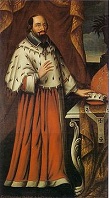



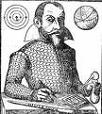





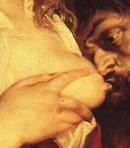
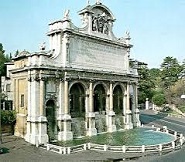
1612 Pop. of London: 325K. On Jan. 19 deposed HRE (1576-1611) Rudolf II (b. 1552) dies of "despondency", and on June 13 after a failed lobbying effort on behalf of elector Maximilian I of Bavaria by his brother Ferdinand of Bavaria (1577-1650), only to have him reject the crown, Bohemian king Matthias (1557-1619) becomes HRE (until Mar. 20, 1619); meanwhile on Feb. 17 Ernest of Bavaria (b. 1554) dies, and Ferdinand of Bavaria is appointed elector-archbishop of Cologne (until Sept. 13, 1650), going on to persecute Protestants and sponsor several fun witch hunts, ramping up the Cologne Witch Persecution, with 37 executed in 1435-1655, most during his reign - it takes a different kind of person to become a firefighter? On Mar. 12 the Virginia Colony gets its Third Royal Charter - every time you turn the wolf on you know it takes you back to that place? On May 24 Sir Robert Cecil, 1st Earl of Salisbury (b. 1563) dies, and is succeeded as English sec. of state by James I's favorite Robert Carr, Viscount Rochester, who next Nov. 3 is created earl of Somerset, followed on Dec. 23 by treasurer of Scotland, and in 1614 by lord chamberlain. On June 8 well-educated Roman Pietro della Valle (1586-1652) leaves Naples on a tour of the East as a cure to a failed love affair, and arrives in Constantinople, spending a year learning Turkish and Arabic; in Mar. 1616 he ends up in the Holy Land in 1616 in time for Easter. In July Peter Floris becomes the first Englishman to visit Phnom Penh - that's phnompenhenal? In July-Aug. the Trial of the Lancashire (Pendle) Witches of 12 witches in Pendle Hill, Lancashire, England charged with the murders of 10 people by witchcraft stinks England up some more; one dies in priz, 11 (9 women, 2 men) go to trial, 10 are found guilty and hung, and one is found not guilty; the last recorded witch burning in England until ? On Aug. 26 the Norwegians ambush Scottish troops in Swedish service under Col. Alexander Ramsay and Lord George Sinclair (1580-1612) (nephew of George Sinclair, 5th earl of Caithness) at the "Scottish" Battle of Kringen (Kringellen). On Nov. 6 James I's eldest son and heir apparent Henry Frederick Stuart, prince of Wales (b. 1594) dies of typhoid, and James has the remains of his dear beheaded mommy Mary, Queen of Scots (d. 1587) moved from Peterborough Castle in Scotland to be with him in Westminster Abbey; James' younger son (momma's boy) Prince Charles, who was not schooled for it becomes heir apparent - you don't have to grow up all at once, so here's more bubbles for your bath? On Nov. 4 Moscow is liberated from Polish invaders by a popular uprising led by Kuzma Minin and Dmitry Pozharsky, causing the Russians to begin commemorating that day as Russian Independence (Unity) Day; on Dec. 3 the Russian fortress of Ivangorod surrenders to the Swedes after 6 mo. of resistance; False Dmitri III is strangled. On Nov. 20 the Ottomans and Persians sign a peace treaty in which the Ottomans surrender their 1590 conquests and accept the 1555 boundaries. On Nov. 29-30 the 4-galleon British East India Co. fleet under Capt. Best decisively defeats the 4-nau Portuguese fleet in the Gulf of Cambay in the naval Battle of Swally (Suvali) near Surat, Gujarat in W India, then founds a trading post (later factory) in Surat in Dec., maintaining a permanent fleet at Swally, near Surat, which becomes the start of the Indian Navy, going on to kick the Portuguese out of the region in the next decade. The Dutch sign a treaty with the King of Kandy in Ceylon, and another treaty with the Ottomans. After private traders infringe royal patents, English mint commissioner Gerard de Malynes proposes a new patent for supplying lead farthings, which is obtained next Apr. 10 by John Harington, 2nd Baron Harington of Exton (1592-1614); too bad, the Haringtons prove unpopular, after Harington dies the private traders begin minting their own again. The Swedish city of Jonkoping (230 mi. SW of Stockholm) is destroyed by its inhabitants by order of Gustavus Adolphus II to keep it out of Danish hands, then rebuilt shortly afterward. After returning to England from Amsterdam and founding the first General_Baptist congregation in England in Spitalfields, East London, Thomas Helwys (1575-1616) pub. "A Short Declaration of the Mistery of Iniquity", criticizing the Mennonites and Puritans, arguing for Arminianism, and appealing to James I to separate church and state to insure freedom of religious conscience, pissing him off and causing him to have Helwys thrown into Newgate Prison, where he dies in 1616; "If the Kings people be obedient and true subjects, obeying all humane lawes made by the King, our Lord the King can require no more: for men's religion to God is betwixt God and themselves; the King shall not answer for it, neither may the King be judge between God and man"; "If our lord the King by his discerning judgment see that as Queen Mary by her sword of justice had no power over her subjects consciences (for then had she power to make them all Papists, and all that resisted her therein suffered justly as evil doers) neither hath our lord the King by that sword of justice power over his subjects consciences: for all earthly powers are one and the same in their several dominions"; meanwhile Baptist co-founder John Smyth (1570-1612) is excommunicated by Helwys from the Baptist Church and joins the Mennonites before dying on Aug. 28. The Dutch use Manhattan as a fur-trading center. The original Marlboro Man wears Jacobean clothes? Commercial tobacco ("green gold") is first raised in Va. as a cash crop by John Rolfe (1585-1622), giving the colony a raison d'etre as a drug dealing supply base, causing it to reorganize with better supply lines and begin establishing satellite squatter settlements on Powhatan farmland, pissing them off; the first crop is the harsh and biting native variety, but he later switches to the more mild Spanish varieties and scores a commercial success, creating the first Am. cash cow; meanwhile the Indians begin going on the defensive as snaphance guns are introduced in this decade, elminating the need for separate matches, and the cleared land gives the English an advantage against Indians, who can shoot arrows 5x as fast but need to hide behind trees; a lame attempt to capture English guns is the only loser's game they got left, and by the 18th cent. they are nearly landless and reluctantly adopt English ways, and by modern times the original 30 tribes are down to five, two on reservations; at least they get to stay? Diego Fernandez de Cordoba, Marques de Guadalcazar and Conde de Posadas (1578-1630) (born in Cordoba, Spain) becomes viceroy of Mexico (until 1621), going on to found the cities of Lerma in Campche (1613), Cordoba in Veracruz (1618), and Guadalcazar in San Luis Potosi (1620), and building an aqueduct from Chapultepec ("hill of the grasshopper") to Mexico City. China prohibits the planting and use of tobacco - making them suckers for opium later? Portuguese Jews are granted a right of residence in Hamburg. The Fettmilch Rising against the Jews in Frankfurt by the guildsmen, led by grocer and gingerbread baker Vincenz Fettmilch begins (ends 1614). Johannes Kepler becomes mathematician to the states of upper Austria in Linz. Architecture: On July 21 Facade of St. Peter's Basilica in Rome is finished; the central balcony is used to announce each new pope with "Habermus Papum". The Fontana dell'Acqua Paola (AKA Il Fantanone = the big fountain) on the Janiculum Hill near the Church of San Pietro in Montorio, Rome is built to mark the end of the Acqua Paola aqueduct restored by Pope Paul V, becoming the first major fountain on the right bank of the Tiber River. Science: German astronomer Simon Marius (1573-1625) rediscovers the Andromeda Nebula, which was first noted by the Muslims in 963. Nonfiction: Accademia della Crusca, Vocabolario della Crusca; a dictionary of the Italian language, which spurs the French, Germans, English, and Spanish to play catch-up. Johann Arndt (1555-1621), Garden of Paradise. Jakob Boehme (1575-1624), Aurora, oder Die Morgenrote im Aufgang (unfinished); teaches that the Fall is a necessary stage in the evolution of the Universe, and that God was incomplete without the Creation; the ms. pisses off Gregorius Richter, chief pastor of his hometown of Goerlitz, who threatens him with exile, causing him to give up writing for years, and not pub. again until 1623. The Three Principles of the Divine Essence. Sethus Calvisius (1556-1615), Elenchus Calendarii Gregoriani (Frankfurt); proposal for reform of the calendar. Samuel Daniel (1562-1619), History of England; thru the reign of Edward III; an earlier vol. about William I the Conqueror was pub. in 1692 under Sir Walter Raleigh's name. Sir John Davies (1569-1626), Discoverie of the True Causes Why Ireland Was Not Entirely Subdued. Roger Fenton (1565-1616), Treatie of Usurie. Antonio Neri, L'Arte Vetraria; glassmaking manual. Samuel Purchas, Hakluytus Posthumus (travels). Capt. John Smith (1580-1631), A Map of Virginia. Alessandro Tassoni (1565-1635), Le Filippiche; pub. anon.; attacks the Spanish domination of Itly. Music: Orlando Gibbons (1583-1625), First Set of Madrigals and Motets. Michael Praetorius (1571-1621), Terpsichore; 300+ instrumental dances. Art: El Greco (1541-1614), The Adoration of the Shepherds. Peter Paul Rubens (1577-1640), Roman Charity (Pero and Simon); ancient Roman story about Pero, who saves her imprisoned daddy Simon (sentenced to death by starvation) by secretly breastfeeding him, until she is found out, after which her selflessnesses wins his release; starts a fad among painters, who can now produce soft core porno and call it art, since it looks so close to the picture of the dead Christ in his mother's arms? Plays: Francis Beaumont and John Fletcher (1579-1625), The Coxcomb. George Chapman (1559-1634), The Widow's Tears. William Shakespeare (1564-1616) and John Fletcher (1579-1625), Henry VIII, or All Is True (alternate title, "All Is True") (1612-13) (history); "No man's pie is freed/ From his ambitious finger" (1.1.52); "The mirror of all courtesy" 2.1.53); "I would not be a queen/ For all the world" (2.3.45); "Press not a falling man too far" (3.2.334); The History of Cardenio (1612-3) (comedy) (lost); based on Miguel Cervants' "Don Quixote"; in 2010 English prof. Brean Hammond claims that Lewis Theobald's 1727 play "Double Falsehood" is based on it, like he claimed all along. John Webster (1580-1635), The White Devil (tragedy) (Red Bull Theatre, London); big flop with Queen Anne's Men, but successfully revived in 1630 by Queen Henrietta's Men at the Cockpit Theatre; The Duchess of Malfi (tragedy) (1612-13); Giovanna d'Aragona marries beneath her class, causing her two brothers to exact bloody revenge. Poetry: Sir William Alexander (1567-1640), An Elegie on the Death of Prince Henry; Paraenesis to the Prince. John Davies of Hereford (1565-1618), The Picture of a Happy Man. William Shakespeare (1564-1616), A Funeral Elegy for Prince Henry; contains one of only six authentic signatures of William Shakespeare that survive into the 21st cent., all of them from the years 1612-1616. Births: English Civil War Parliamentary CIC Thomas "Black Tom" Fairfax, 3rd Lord Fairfax of Cameron (d. 1671) on Jan. 17 in Denton, West Riding of Yorkshire. French Roman Catholic theologian-philosopher-mathematician Antoine "the Great" Arnauld (d. 1694) on Feb. 6 in Paris; son of jurist Antoine Arnauld; educated at the Sorbonne; co-founder with Jean du Vergier de Hauranne (1581-1643) of Jansenism. English dramatist-mgr. Thomas Killigrew (d. 1683) on Feb. 7; starts as a page to Charles I at age 13, and works his way up. English anti-Puritan "Hudibras" satirical poet Samuel Butler (d. 1680) on Feb. 8 in Strensham, Worcestershire; not to be confused with "Erewon" novelist Samuel Butler (1835-1902). French officer (founder of Montreal) Paul de Chomedey, Sieur de Maisonneuve (d. 1676) on Feb. 15 in Neuville-sur-Vannes, Champagne. Italian duke of Parma and Piacenza #5 (1622-46) Odoardo I Farnese (b. 1646) on Apr. 28; sole legitimate son of Ranuccio I Farnese (1569-1622) and Margherita Aldobrandini. Ottoman sultan #17 (1623-40) Murad (Murat) IV (the Cruel) (d. 1640) on June 16; son of Ahmed I (1590-1617) and Kadinefendi Kosem Sultan (Greek); brother of Osman II (1604-22) and Ibrahim I (1615-48); nephew of Mustafa I (1591-1639). Scottish covenanter-royalist military leader James Graham, 5th Earl and 1st Marquess of Montrose (d. 1650) on Oct. 25 in Old Montrose, Edinburgh; only son of John Graham, 4th earl of Montrose and Lady Margaret Ruthven; educated at St. Andrews U.; husband of Magdalene Carnegie; father of James Graham, 2nd marquess of Montrose (1631-69). French Baroque painter Pierre Mignard "Le Romain" (d. 1695) on Nov. 7 in Troyes; uncle of Pierre II "Le Chevalier" Mignard (1640-1725). English astronomer-mathematician (inventor of the micrometer) William Gascoigne (d. 1644) in Middleton, Leeds; educated at Oxford U.? French classical architect (for Louis XIV) Louis Le Vau (d. 1670) in Paris. Am. poet ("the Tenth Muse") (first English language female poet in the Am. colonies?) Anne Dudley Bradstreet (d. 1672) in Northampton, England; daughter of Thomas Dudley; wife of Simon Bradstreet; emigrates with her husband to Mass. in 1630. German Bohemian Baroque composer-organist Andreas Hammerschmidt (d. 1675) (b. 1611?) in Brux, Bohemia; Saxon father, Bohemian mother. Deaths: Italian painter Federico Barocci (d. 1528). Polish poet Peter Skarga (b. 1536). German astronomer Christopher Clavius (b. 1538) on Feb. 6 in Rome. Italian poet Giovanni Battista Guarini (b. 1538) on Oct. 7 in Venice. English botanist John Gerard (b. 1545) in Feb. in London. French economist Barthelemy de Laffemas (b. 1545) in Paris; dies after falling off his horse on Sept. 23. Spanish dramatist-poet Juan de la Cueva de Garoza (b. 1550). Austrian HRE (1576-1612) Rudolf II (b. 1552) on Jan. 19. Russian tsar (1606-12) Vasily IV (b. 1552). Italian composer Giovanni Gabrielli (b. 1557) in Aug. English flush toilet inventor Sir John Harington (b. 1560) on Nov. 20 Kelston, Somerset. English lord Edward, Lord Beauchamp (b. 1561) on July 21. Italian duke of Mantua and Montferrat (1587-1612) Vincenzo I Gonzaga (b. 1562) on Feb. 9 in Mantua. British MP (1598-1612) Robert Cecil, 1st earl of Salisbury (b. 1563) on May 24. English Baptist church denomination founder John Smyth (b. 1570) on Aug. 28. English explorer George Weymouth (b. 1585). Scottish-born Prince of Wales Henry Frederick Stuart (b. 1594) on Nov. 6 (typhoid).










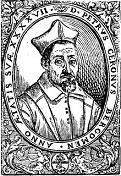
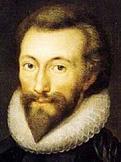
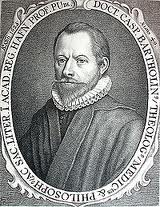




1613 On Jan. 20 the Peace (Treaty) of Knaerod ends the Danish-Swedish War of Calmar (begun 1611). On Feb. 14 Frederick (Friedrich) V (1596-1632), elector palatine of the Rhine marries royal It Girl Elizabeth Stuart (Stewart) (1596-1662), eldest daughter of King James I of England and Anne of Denmark (whose enthronement in England-Scotland was the goal of the 1605 Gunpowder Plot), and becomes known as Elizabeth of Bohemia, residing in the court in Heidelberg and becoming known as the Queen of Hearts for her popularity; Frederick is then recognized as the head of the Protestant (Evangelical) Union of Germany, which signs a treaty of alliance with Holland; in May 14 plays in honor of the marriage are given in London by the King's Men, incl. 6-7 of Shakespeare's troupe; Elizabeth later bears 13 children, incl. Sophia (Sophie) of Hanover (1630-1714), who founds the Hanoverian Dynasty of England via her son George I. On Feb. 21 after False Dmitri IV is beheaded, 17-y.-o. Michael I (Mikhail Fyodorovich Romanov) (1596-1645), son of patriarch Filaret of Moscow and Great Nun Martha (Xenia) is elected as Russian tsar #1 (until July 12, 1645) of the Romanov Dynasty (ends Mar. 15, 1917), which rules for the next 300 years, ending the Time of Troubles; the Romanovs bring about a total enserfment of the people, while the church becomes dependent on the state for its authority - it's worth having a good simple black suit in your wardrobe? You are my sunshine? In the spring former Va. gov. Sir Thomas Dale and his men capture 17-y.-o. Pocahontas and hold her for a ransom of English prisoners, guns, and a boatload of corn, and when her daddy pays it they keep her anyway; William Strachey calls her "well featured but wanton" after seeing her do cartwheels naked; to fend off war (or his libidinous feelings?), prosperous widower John Rolfe then writes to Dale apologizing for being in love with a you know what and begging for permission to marry her, and her aging and increasingly docile pop Powhatan (Wahunsonacock) acquiesces; she is baptized in the Anglican church and given the name Lady Rebecca, and becomes the first Amerindian woman to marry an Englishman - another high maintenance woman not wanting no maintenance man? On June 29 the Globe Theatre in Southwark, London burns down in two hours after a loose dick, er, tom, er cannon is set off during a performance of Shakespeare's "Henry VIII"; no one is hurt and the Globe is rebuilt in June 1614, and closed in 1642; too bad, in 1610 at the pinnacle of his career William Shakespeare retires to New Place in Stratford-upon-Avon, also buying a house in Blackfriars; John Fletcher takes over as house playwright for the King's Men - from spears to arrows? In Oct. Calvinist Bethlen Gabor (Gabriel Bethlen) (1580-1629) becomes prince of Transylvania (until Nov. 15, 1629), going on to lead a revolt against the House of Hapsburg. On Dec. 21 Galileo writes a letter to Benedetto Castelli. Sir Thomas Dale hires mercenaries to drive the French out of Acadia, and they destroy Mount Desert Island, a French colony on the Kennebec River established last year by French Jesuit missionary Pierre Biard (1565-1622), becoming the first hostilities between French and English settlers in North Am.; Biard is taken POW and transported to England, is later freed, and returns to Lyon, France; the British capture and burn Port Royal. The Turks invade Hungary. After the Ottomans put him up to it, a 50K-man army under Damascus ruler Ahmad el-Hafez and Youssif Sifa attacks Lebanon, causing Lebanese ruler Fakhr al-Din II to flee to exile to Cosimo II's Tuscany (until 1618), giving control to his brother Younes and son Ali, who finally secure a truce after losing Tripoli, Sidon and Bekaa; al-Din is introduced to Italian Renaissance culture. Francis Bacon becomes English atty.-gen. (until 1621), going on to use torture to obtain the conviction of Edmund Peacham for treason; next year Parliament passes a law forbidding the atty.-gen to sit there. Robert Ker (Car) (1587-1645), youngest son of a Scottish border laird who becomes James I's lover, er, favorite is created earl of Somerset; too bad, the Earl of Essex's divorced wife Lady Frances Howard marries him, causing him to slip, er, fall from grace next year and be replaced by new pretty boy court favorite George Villiers (1592-1628), who is also a good friend of James' son Prince Charles. Georgian-born Imam Mahmud Qilich (Quli) Khan (-1632) is appointed gov. of the Persian province of Fars in S Persia, and goes on to work with the English to oust the Portuguese from Hormuz; too bad, he gets too wealthy and powerful, causing Shah Safi I to plot to get safely rid of him. Dutch East India Co. officer Jan Pieterszoon Coen (1587-1629) is appointed accountant-gen. and pres. of the head office in Bantam, going on to become gov.-gen. in 1617-23, going on to establish a Dutch monopoly over nutmeg and mace from the Banda Islands and become known for his violence and cruelty, incl. beheading a soldier for having sex with Saarje Specx (1617-36), a girl in his care, but showing his soft side by having her whipped instead of drowned in a barrel; he utters the soundbyte "Despair not, spare your enemies not, for God is with us". French explorer Samuel de Champlain explores the Ottawa River to Alumette Island. The Jacob Barnet Affair sees Jewish teacher Jacob Barnet arrested and imprisoned by the U. of Oxford for changing his mind about being baptized. Portuguese Catholic missionary Alvaro de Semedo (1585-1649) travels to China. Japanese samurai Hasekura Rokuemon Tsunenaga (1571-1622) begins the Keicho Embassy to Europe, starting with the Vatican in Rome, then New Spain (Acapulco, Veracruz), and France in 1615, becoming the first Japanese diplomatic embassy to Europe; after the Japanese suppression of Christianity pisses-off the Euro monarchs, he ends up returning in 1620 without negotiating any trade agreements - the original honk if you're horny? The U. of Cordoba in Argentina is founded. Belfast in N Ireland by the Lagan River is incorporated when James I grants it a charter; it is settled by Presbyterians and Huguenots. Francis Beaumont (1584-1616) marries Ursula Isley of Sundridge and leaves the stage - it's about finding solutions to everyday needs? Caspar Bartholin the Elder (1585-1629) becomes prof. of medicine at Copenhagen U., after which two generations of descendants keep the chair for the next 125 years, making key discoveries in anatomy and medicine; still having a foot in both camps, in 1624 Caspar falls ill, makes a vow that if he recovers he will switch to divinity, then switches to prof. of divinity - back when Science was still small enough to become a family thang? Claudio Monteverdi becomes maestro di cappella at St. Mark's in Venice, one of the top musical jobs in Italy (until 1632). Adrian Block and Hans Christiansen establish the first brewery in the New World on the S tip (Manhattan) of New Amsterdam; in 1614 Jan Vigne (1624-89) becomes the first non-native American (first white Euro male) born in New Netherland at the Block and Christiansen Brewhouse; he grows up to become the first brewer born in the New World. Architecture: Salomon de Brosse builds the Chateau Coulommiers. The Church of St. Anthony of Padua is built in Isleta Pueblo (S of modern-day Albuquerque) in New Mexico by forced Indian labor, becoming the oldest (Romanu Catholic) church in the U.S.?; damaged during the 1680 Pueblo Revolt, it is refurbished and rededicated to St. Augustine between 1700-10. Welsh entrepreneur and self-taught engineer Sir Hugh Myddleton (1560-1631) builds the New River Cut to bring water to London via the Lea River Valley. The Amsterdam Exchange in Netherlands is built. Inventions: Copper coins first come into use in Europe - got the idea from Pocahontas? German miners become the first to use explosives in mining with drilling. Science: In July Galileo Galilei and his archenemy Lodovico delle Colombe (1565-1616) (known for challenging his idea that the Earth revolves around the Sun) debate in Florence on the question of why ice floats on water, with Galileo arguing that ice floats because it's less dense than water, and delle Colombe winning after floating a thin wafer of ebony using surface tension. Nonfiction: Pedro de San Buenaventura, Dictionary of Tagalog; pub. by Tomas Pinpin of Pila, Laguna, Philippines; first Tagalog dictionary. Pietro Cerone (1566-1625), El Melopeo y Maestro: Tractado de Musica Theorica y Pratica; en que se pone por extenso; lo que uno para hazerse perfecto musico ha menester saber (22 vols.); monstrously large and absurd compilation of nonsense on musical theory, making him a star for cents.? Michael Drayton (1563-1631), Map of Hampshire, England. John Dennys, The Secrets of Angling. Sir Henry Fitch (-1625), Nomotexnia (4 vols.); a treatise on law which becomes the std. until William Blackstone. Galileo Galilei (1564-1642), Letters on Sunspots. Sir John Hayward, Lives of the Three Norman Kings of England; written at the request of James I's son Prince Henry. Oliver de Serra (1539-1619), The Causes of Wealth. Sir Anthony Shirley (1565-1635), Sir Anthony Sherley, His Relation of His Travels into Persia - even an astronaut has to go potty? Francisco Suarez (1548-1617), Defensio Catholicae Fidei Contra Anglicanae Sectae Errores (Defense of the Catholic Faith Against Errors of the Anglican Sect). Art: Cristofano Allori (1577-1621), Judith with the Head of Holofernes; modelled by Mazzafirra, with the head being modeled after himself. Lavinia Fontana (1552-1614), Minerva Dressing. Artemisia Gentileschi (1593-1653), Judith and Her Maidservant (1613-14). Guido Reni (1575-1642), Aurora (frescoes) (Rome); St. Dominic's Glory (Basilica of San Domenico, Bologna) (1613-5). Music: Thomas Campion (1568-1639), The Lord's (Lords') Masque. Plays: Francis Beaumont (1584-1616) and John Fletcher (1579-1625), The Scornful Lady; The Captain. Gerbrand Bredero (1585-1618), Klucht van de Koe (comedy); Klucht van Symen ender Soelighyd (1612-13) (comedy). Lope de Vega (1562-1635), Fuenteovejuna; The Foolish Lady. George Chapman (1559-1634), The Revenge of Bussy D'Ambois (tragedy). Pieter Hooft (1581-1647), Geeraerd van Velsen (tragedy). William Shakespeare (1564-1616) and John Fletcher (1579-1625), The Two Noble Kinsmen (comedy); Theseus, Duke of Athens and Hippolyta, Queen of the Amazons, Emilia, Palamon, and Arcite; "O grief and time,/ Fearful consumers, you will all devour!" (1.1.69-70). Poetry: John Donne (1572-1631), Good Friday, 1613, Riding Westward. Michael Drayton (1563-1631), Polyolbion, Pt. 1; patriotic description of England; Pt. 2 in 1622. Cyril Tourneur (1575-1626), A Grief on the Death of Prince Henrie, Expressed in a Broken Elegie. Novels: William Browne, Britannia's Pastorals. Miguel Cervantes (1547-1616), Novelas Ejemplares (Everyday Tales); 12 novelettes; first short stories in Castilian Spanish? Births: Italian Baroque painter Mattia Preti (Il Cavalier Calabrese) (the Calabrian Knight) (d. 1699) on Feb. 24 in Taverna, Calabria; brother of Gregorio Preti; student of Giovanni Battista Caraccio; accepted into the Order of St. John (Knights of Malta) in 1660, spending the rest of his life in Malta. French Versailles landscape architect Andre Le Notre (Nostre) (d. 1700) on Mar. 12 in Paris; born to a family of gardeners responsible for the Tuileries Garden; Louis XIV's gardener in 1645-1700. English Puritan statesman and Mass. Bay Colony gov. #6 (1636-7) Sir Henry (Harry) Vane Jr. (the Younger) (d. 1662) on Mar. 26 in Hadlow, Kent. Dutch portrait-genre painter Gerrit (Gerard) Dou (Dow) (Douw) (d. 1675) on Apr. 7 in Leiden; pupil of Rembrandt (1606-69); teacher of Gabriel Metsu (1629-67). German Wettin elector of Saxony (1656-80) Johann Georg (John George) II (d. 1680) on May 31 in Dresden; 3rd son of Johann Georg I (1585-1656) and 2nd wife Magdalene Sybille of Prussia; father of Johann George III (1647-91). English Anglican bishop-writer Jeremy Taylor (d. 1667) on Aug. 15 in Cambridge. German merchant Johann Siegmund Wurffbain (d. 1661) on Aug. 20 in Nuremberg. French "Maxims" writer Francois VI, Duc de La Rouchefoucauld, Prince de Marcillac (d. 1680) on Sept. 15 in Paris. French architect Claude Perrault (d. 1688) on Sept. 25 in Paris. French churchman Jean Francois Paul de Gondi, Cardinal de Retz (d. 1679) on Sept. 29 in Montmirail. Portuguese queen consort (1640-56) and regent (1656-62) Luisa Maria Francisco de Guzman (Guzmán) y Sandoval (d. 1666) on Oct. 13 in Sanlucar, Spain; wife of Joao VI; mother of Afonso VI (1643-83), Peter II (1648-1706), and Catherine of Braganza (1638-1705). Swedish gen. Carl (Karl) Gustaf Wrangel (d. 1676) on Dec. 23 near Uppsala; of Baltic German descent. English poet Richard Crashaw (d. 1649). Dutch genre painter Bartholomeus van der Helst (d. 1670 in Haarlem. Deaths: Greek Catholic Church (Unia) founder Ipaci Pocei on June 25. English diplomat Sir Thomas Bodley (b. 1545); leaves the bulk of his fortune to the Bodleian Library in Oxford. German composer Bartolomaus Gese (b. 1555). Venetian composer Giovanni Gabrieli (b. 1557). Italian architect Flaminio Ponzio (b. 1560) in rome. Italian mathematician Bartholomeo Pitiscus (b. 1561). Italian composer Carlo Gesualdo (b. 1566) on Sept. 8 in Avellino (murdered by his wife?). Transylvanian prince Sigismund Bathory (b. 1572) on Mar. 27 in Prague (in exile). French satirist Mathurin Regnier (b. 1573) on Oct. 22 in Rouen. English poet-dramatist Sir Thomas Overbury (b. 1581) on Sept. 15 in the Tower of London; slowly poisoned with copper vitriol (sulfuric acid) at the instigation of the countess of Essex for opposing her marriage to his buddy Robert Carr, viscount Rochester. French chef Lancelot (Anseau) de Casteau (Chasteau) (Chestea) (b. ?); Mons-born master chef for three prince-bishops of Liege.








1614 In Feb. after he converts from Lutheranism to Calvinism, and has his officials draw up plans for mass conversion of his people, which are stopped by his Lutheran wife, the Confession of Brandenburg, prepared by order of Brandenburg elector John Sigismund Hohenzollern (1572-1619) attempts to reconcile the tenets of Lutheranism and Calvinism and ends the disputes caused by the Augsburg Confession; the people are permitted to remain either Lutheran or Calvinist as they wish, turning Brandenburg-Prussia into a bi-confessional state. The power of Powhatan outpowers English racism? On Apr. 15 Pocahontas, daughter of the Powhatan chief marries English tobacco tycoon John Rolfe in Jamestown's church; they have one son, Thomas; for centuries distinguished Virginians boast of their descent from the "Indian princess". In Apr. Capt. John Smith leads several ships on a voyage from London to the Maine and Mass. Bay areas, naming them New England with the approval of Prince Charles, and creating the first detailed Map of New England; Thomas Hunt, one of the ship capts. decides to fill his ships with Nauset Indians to sell as slaves in Malaga, Spain, turning the Nausets against the English and damaging English-Indian relations for years; one of them is Squanto (Tisquantum) (1585-1622), who spends five years in Spain, England, and Newfoundland (until 1619), learning Paleface Talk (English). On May 15 after Marie de' Medici arranges the betrothal of her son Louis XIII to Anne of Austria, daughter of Philip III of Spain, the Huguenots get pissed-off and take up arms, but finally give up and accept the Peace (Treaty) of St. Menehould; Louis confirms the Edict of Nantes, and summons the Etats Generaux (Estates Gen.) for the last time until Louis XVI in 1789. On Aug. 22 gingerbread baker Vincenz Fettmilch (-1616) leads the citizens of Frankfurt against their 1,380 Jews, who are plundered and forced to leave the city. On Nov. 12 the Treaty of Xanten ends the War of the Julich Succession (begun 1609), dividing Julich-Cleves (home of Henry VIII's ugly frau Anne of Cleves) between John Sigismund, elector of Brandenburg and Wolfgang William, duke of Palatinate-Neuburg, giving Prussia its first toehold in the Rhineland. A group of Dutch colonists led by Capt. Hendrick Christiaensen (-16169) founds Ft. Nassau (van Nassouwen) in New Netherland on the ruins of an old French fur trader fort on Castle Island on the Hudson River 10 mi. S of its confluence with the Mohawk River opposite the site of modern-day Albany, N.Y. (modern-day pop. 98K/1.2M), becoming the first Dutch settlement in North Am., followed in 1624 by Ft. Orange on the W bank of the Hudson River, engaging in fur trade with the Mahicans and Mohawks, causing more settlers to found the village of Beverwijck (Beverwyck) nearby to the N on the future site of Albany; in 1664 the English take over, renaming the city in honor of the Duke of Albany, future James II of England, officially chartering it in 1686; in 1797 it becomes the capital of N.Y. state; it goes on to become the longest continuously-chartered U.S. city. The Dutch build a fort 90 mi. N of New Amsterdam on the site of future Kingston, N.Y., initially named Esopus after a local tribe, then Wiltwijck, which is settled in 1651, becoming one of the three main Hudson River settlements of New Netherland along with Beverwyck (Albany) and New Amsterdam. James I's 2nd Parliament, AKA the Addled Parliament meets, but refuses to discuss finances, so he dissolves it. Gustavus Adolphus II of Sweden captures Novgorod from the Russians. The Turks raid Hospitaler-held Malta. Louis XIII (b. 1601) is declared of age to rule, but his domineering mother Marie de' Medici retains control, and summons the estates-gen. to counteract the power of the nobility; Louis never gains control throughout his life, even after mommy dies - well done, well done? Virginia colonists prevent French settlements in Maine and Nova Scotia. The long-awaited Promised Land for International Jewry? After setting out late in 1613 to New York harbor in the Tijger (Tiger), Dutch navigator Adriaen (Aerjan) Block (1567-1627) anchors in the harbor, his ship burns, and he and his crew camp on Manhattan Island, where they build the Onrust (Restless), then explore Long Island Sound N beyond Cape Cod, discovering the Connecticut River and Block Island (9 mi. SW of Point Judith, Rhode Island); he claims Connecticut (Conn.) (Algonquin "Quinnehtukqut" = "beside the long tidal river") for the Netherlands, and names it Rhode Island (R.I.) for its red clay; he later pub. Figurative Map of 1614, the first to show Manhattan Island as separate from Long Island; in 1623 fur traders from New Amsterdam set up Ft. Goede Hoop (Ft. Good Hope) at the confluence of the Connecticut and Park Rivers, which is abandoned in 1654, after which English settlers begin arriving in 1637, founding Newtown, which soon becomes Hartford, Conn. (modern-day pop. 124K/1.4M), named after Hertford, England; it is incorporated as a city in 1784, and consolidated in 1896; the city seal depicts a male hart (deer) crossing a you know what. The city of Tirana, Albania in C Albania 19 mi. E of Durres, 95 mi. SW of Skopje, 82 mi. SE of Podgorica, and 310 mi. N of Athens (modern-day pop. 860K) is founded by Sulejman Pasha Bargini as the site of a market, Turkish bath, and mosque, going on to become the cultural hub and seat of govt. in Albania; in 1912 after Albania declares independence, it becomes the capital. Dutch explorer Cornelis Hendricksz then takes the Onrust and begins exploring the Delaware Bay and the Lower Delaware River, after which on Oct. 11 the New Netherland Co. receives an exclusive patent for four voyages to be undertaken over three years to discover territories between the 40th and 4th parallels (until June 1618), causing Dutch explorer Cornelius Jacobsen Mey (May) (Meij) to begin exploring the Lower Delaware River on his ship Blijde Boodschap (Joyful Message). Sir Thomas Dale becomes gov. of Va. again (until 1616), and gives each of the Virginia Co. colonists three acres of land for his own use, starting a policy that every colonist can claim a plot of land; King James I makes the import of tobacco a royal monopoly; Virginia enters the world tobacco market. Jesuit superior general Claudio Acquaviva orders the lower part of dead Jesuit missionary Francis Xavier's right arm cut off and shipped to Rome; Dutch pirates try to capture it but fail. Japanese shogun Iyeyasu orders all Christian priests to leave Japan, and orders the Japanese to give up Christianity. King Philip III establishes Seville as the shipping point for New World tobacco. Sir Fulke Greville, 1st Lord Brooke becomes chancellor of the exchequer (until 1621). Roman Catholic-raised John Donne (1572-1631) converts and takes holy orders in the Anglican Church, becoming the most eloquent preacher in England; "Death be not proud... Death, thou shalt die!" The Augsburg banking house of Welser declares bankruptcy. Founders' typefounder's co. in London is incorporated. The U. of Groningen in Groningen, Holland is founded. The glass industry begins in England. Science: Swiss physician Felix Platter (Plater) (1536-1614) first describes Dupuytren's Disease; the first proponent of the Germ Theory of Disease? Architecture: Santino Salari begins Salzburg Cathedral (finished 1680). Music: Girolamo Frescobaldi (1583-1643), Toccate di Cembalo. Marco da Gagliano (1582-1643), Masses and Motets. Sir William Leighton, The Teares and Lamentacions of a Sorrowful Soule (54 psalms). Art: Domenichino (1581-1641), Last Communion of St. Jerome (San Girolama della Carita, Rome). Nonfiction: Anon., Fama Fraternitatis (The Fame of the Brotherhood); Confessio Fraternitatis (The Confession of the Brotherhood); (Kassel, Germany); the founding document of Rosicrucianism, claiming to be founded by mythical Christian Rosenkreuz (1378-1484); incl. Allgemeine and General Reformation der Ganzen Weiten Welt. Thomas Lodge (tr.) (1558-1625), The Workes of Lucius Annaeus Seneca, Both Morall and Naturall; first English trans. of the works of Seneca. Simon Marius (1573-1624), Mundus Iovialis (Jovalis); claims to have discovered Jupiter's four major moons before Galileo; true or not, he names them Io, Europa, Ganymede (largest moon in the Solar System), and Callisto (3rd largest moon in the Solar System, but only 99% the diam. of Mercury) (always shows same face toward Jupiter); Io, Europa and Ganymede have an orbital resonance that gives them tidal heating. John Napier (1550-1617), Description of the Marvelous Canon of Logarithms (Mirifici Logarithmorum Canonis Descriptio); gives mathematicians and astronomers a new improved method of computation, and uses the decimal point to express decimal fractions. Michael Praetorius (1571-1621), Syntagma Musicum (3 vols.) (1614-20); musical encyclopedia. Sir Walter Raleigh (1554-1618), The Historie of the World; covers from Creation to ancient Greece and Rome, ending with the Second Macedonian War after he quits before writing vols. 2-3 because of the 1612 death of his hero Prince Henry; written while imprisoned in the Tower of London from July 19, 1603-1616; James I stops pub. "for divers exceptions, but especially for being too saucy in censuring Princes." Thomas Ravenscroft (1582-1635), A Briefe Discourse on the True (but Neglected) Use of Charact'ring the Degrees; treatise on music theory. Au contraire, I'm au fond au courant and au fait, never saying auf Wiedersehen to the Aufklarung? Sir Walter Raleigh (1552-1618), The History of the World, Vol. 1; Creation to 130 B.C.E.; no other vols. are produced; outsells Shakespeare - insert TLW jokes here? Santorio Santorii (Santorio) (1561-1636), De Medicina Statica: Being the Aphorisms of Sanctorius; Italian prof. of medicine describes how he spent days on a balance weighing his food and excreta in order to establish that the body loses weight through "invisible perspiration"? - get a load of you? Plays: Lope de Vegas (1562-1635), The Sheep Well (Fuente Ovejuna); his most popular work. Ben Jonson (1572-1637), Bartholomew Fayre (Fair): A Comedy (Hope Theatre, Bankside) (Oct. 31) (Whitehall, London) (Nov. 1); performed by Lady Elizabeth's Men, starring Nathan Field, who is paid 10 pounds by James I; last of four comedies; the 4-day fair in Smithfield each year on Aug. 24-27; amateur playwright Littlewit and his friends Quarious and Winwife plot to win widow Dame Purecraft from hypocritical Puritan Zeal-of-the-Land Busy; meanwhile Cokes comes to town with his servant Wasp to marry Grace Wellborn, ward of justice of the peace Adam Overdo, whose wife is Cokes' sister. Poetry: Sir William Alexander (1567-1640), Domesday, or The Great Day of the Lord's Judgment (epic). Sir Thomas Overbury (1581-1613), Characters; The Wife (posth.); his scandalous death makes it one of the hits of the cent. Births: English clergyman and natural philosopher Bishop John Wilkins (d. 1672) on Jan. 1 in Canons Ashby, Northamtonshire; educated at Hertford College, Oxford U. Austrian gen. archduke (gov. of the Spanish Netherlands from 1647-56) Leopold Wilhelm von Hapsburg (d. 1662) on Jan. 5 in Weiner Neustadt; youngest son of HRE Ferdinand II (1578-1637) and Maria Anna of Bavaria (1574-1616) (daughter of Duke William V of Bavaria); brother of HRE Ferdinand III (1608-57). Dutch Flemish physician Franciscus Sylvius (Franz de le Boe) (Boë) (d. 1672) on Mar. 15 in Hanau, Germany. English Platonist philosopher-theologian Henry More (d. 1687) on Oct. 12 in Grantham; educated at Christ's College, Cambridge U.; coiner of the term "Spissitude" for the 4th spatial dim. of the spiritual realm, with cardinal directions ana/kata, coined by Charles Howard Hinton. English Popish Plot royalist William Howard, 1st Viscount Stafford (d. 1680) on Nov. 30; eldest son of Thomas Howard, 21st earl of Arundel and Alethea Talbot. English Leveler Puritan-turned-Quaker John "Free-Born" Lilburne (d. 1657); coiner of the term "freeborn rights". Irish Protestant leader Murrough MacDermod O'Brien, 1st Earl of Inchiquin (d. 1574); created earl in 1653. Spanish painter Juan Carreno (Carreńo) de Miranda (d. 1685) in Aviles, Asturia. English Quaker "nursing mother" (feminist) Margaret Askew (Fell) (Fox) (d. 1702) in Lancashire. Deaths: Irish lord treasurer Thomas Butler, 10th earl of Ormonde (b. 1531) on Nov. 22. Swiss physician Felix Platter (b. 1536) on July 28 in Basel. English architect Robert Smythson (b. 1536). French biographer Pierre de Bourdeilles, seigneur de Brantome (b. 1540) on July 15; leaves Vies des Grands Capitaines Etrangers et Francais, Vies des Dames Galantes, and Vies des Dames Illustres. English statesman Henry Howard, 1st earl of Northampton (b. 1540) on June 15; dies without an heir; dies a Roman Catholic. Cretan-born Greek painter El Greco (b. 1541) on Apr. 7 in Toledo, Spain. French marshal Jean de Beaumanoir, marquis de Lavardin (b. 1551). Italian painter Lavinia Fontana (b. 1552) on Aug. 11. French architect Jacques II Androuet du Cerceau (b. 1556). Swiss-born French scholar-theologian Isaac Casaubon (b. 1559) on July 1 in England. Hungarian vampire lady Elizabeth Bathory (b. 1560) on Aug. 21 in Cachtice Castle, Slovakia. English inventor William Lee (b. 1563) in Paris. English politician John Harington, 2nd Baron Harington of Exton (b. 1592) on Feb. 27 in Kew.










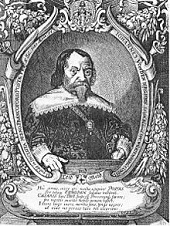
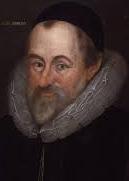

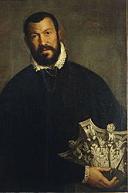



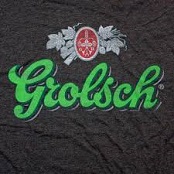
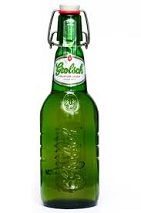
1615 I am wearing a polka-dot parachute, or Captain Cookoff and his son Gourmet Gal? Living, loving, he's just a woman? The original English Brokeback Mountain? In Jan. James I of England knights his pretty boy court favorite and lover (the duke of bucking hams?) George Villiers (1592-1628), whom he calls "sweet child and wife", and to whom Georgie replies "I naturally so love your person, and adore all your other parts, which are more than ever one man had" and "I desire only to live in the world for your sake"; well-bucked James I goes on to raise him to the peerage as the 1st earl of the extinct (since 1521) line of Buckingham in 1517, and after each sexual thrill gets better he raises him higher and higher, to marquess of Buckingham in 1618, then earl of coventry and duke of Buckingham in 1623, making him the highest-ranking subject outside the royal family. On May 6 the Peace of Tyrnau is signed by HRE Matthias and Gabor Bethlen, recognizing the latter as prince of Transylvania, and confirming his treaty with the Turks. On June 14 Dutch mariner Jacob Le Maire (1585-1616) and Willem Schouten embark on a round-the-world voyage from Texel, Netherlands; on Jan. 29, 1616 they become the first to round Cape Horn, named after their ship Hoorn (named after the town in N Holland), which was lost in a fire, and discover the Le Maire Strait; too bad, they are arrested in Java by the jealous Dutch East India Co. for violating its trade monopoly, and their remaining ship Eendracht is confiscated, and Le Maire dies on the remaining ship Amsterdam on return journey to Amsterdam, which ends on July 1, 1617 after 2 years 17 days - fills the need for speed, or there's only one way to rock? On June 27 the first English language reference is made to tea by R. Wickham, agent of the English East India Co. on Hirado Island, Japan in a letter to his colleage Mr. Eaton in Macao, asking for "the best sort of chaw". Beleaguered Italian scientist Galileo Galilei (1564-1642) writes an Open Letter to Madame Cristina of Lorraine, Grand Duchess of Tuscany on his Copernican views, trying to clear himself of the appearance of being an unbeliever, claiming that the Book of Nature is to be read in the language of mathematical science, while the Scriptures when referring to physical fact are not to be taken literally, "nor does God reveal himself less admirably in the effects of Nature than in the sacred words of Scripture"; the purpose of the Scriptures is to teach us "how to go to heaven, not how the heavens go"; the priestly authorities are not amused, and in Dec. Galileo is summoned before the Inquisition in Rome and put on trial for his scientific views in a super-rigged trial; "To assert that the Earth revolves around the Sun is as erroneous as to claim that Jesus was not born of a virgin" (Cardinal Robert Bellarmine (1542-1621), head of the Congregation of the Holy Office, who personally framed the decision to burn Giordano Bruno in 1600, and is not a student of astronomy); Galileo's observations with the telescope actually backed the Tychonic view that the Earth doesn't move, but he stuck with the Copernican system anyway, and was just lucky? You are now free to move about the country? On Nov. 24 French King Louis XIII marries 14-y.-o. Anne of Austria (1601-66) (daughter of Philip II of Spain) in Burgos by proxy; meanwhile the same day Infante Philip of the Asturias (later Philip IV) marries Louis XIII's sister Elisabeth of Bourbon (1602-44) by proxy in Bordeaux; the two princesses are later exchanged like hostages on the Isle of Pheasants in the Bidassoa River between France in Spain near Henday, cementing the alliance between the French and Spanish Catholic royal houses; Cardinal Richelieu suspects Anne of disloyalty to France because of her Hapsburg descent, accusing her of several treasonable conspiracies, and for that or other reasons Louis and Anne eventually can't stand each other and begin living separately in 1620; meanwhile the Three Musketeers Athos, Porthos, and Aramis defend Anne's honor against scheming Cardinal Richelieu :). Spain begins a war with Italy (ends 1617). The French Estates General are dismissed with promises of reforms. Samuel Champlain and Etienne Brule (Brulé) 1592-1633) (who was sent in 1610 to live with the Algonquins and learn their language) explore Lake Huron and Lake Ontario ("fine lake"), and visit the Huron (Fr. "unkempt head") tribe; Brule continues along the Susquehanna River (to Chesapeake Bay?). The limping Virginia Co. raises funds through lotteries. The first British ambassador to India is dispatched to the court of the Mogul Emperor in India; the British presence in India begins. Tokugawa Ieyasu attacks the stronghold of the rival Toyotomi clan, fails to take it, and agrees to a truce requiring clan head Hideyori (b. 1593) to dismantle many of his castle's defense, but he reneges, and Ieyasu returns and this time takes the stronghold, causing Hideyori and his mother to commit hari-kari, ending the house of Toyotomi. The Qing Dynasty forms in the murky corners of Manchuria and feeds on the decay of the Ming Dynasty? In 1615 the Tungusic tribes in E Manchuria expand to eight banners (military regions) under Nurhachi (Nurhaci) (1559-1626), who next year takes the title of Emperor Taizu of the Hou Jin (Later Jin) Dynasty, claiming ethnic descent from the Jurchens of the 12th cent., and takes the clan name Aisin Gioro, founding the Manchu Dynasty in China, later ordering the creation of a written script Manchu Language, using a script borrowed from the Mongolian Ulighur alphabet, which becomes the language of China's official circles; by the mid-19th cent. it begins to be superseded by Mandarin Chinese. A revolt in Tbilisi, Georgia against the Persians under Shah Abbas I is quashed, with 60K killed and 100K deported. Bad year for the Portuguese? The Dutch seize the Spice Islands (Moluccas) from the Portuguese. The English fleet defeats the Portuguese in the naval Battle of Bombay. The Persians seize the port city of Bandar Abbas on the Straits of Hormuz from the Portuguese, and Shah Abbas I names it after himself. The Merchant Adventurers are granted a monopoly for the export of English cloth. Dutch navigator Willem Cornelis (Cornelisz) Schouten (1567-1625) and his financier-journalist Jacob Le Maire (Lemaire) (1585-1616) begin a round-the-world voyage in the Hoom (named after Schouten's birthplace) and Eendracht looking for a new route from the Netherlands W to the East Indies without rounding the Cape of Good Hope in order to get around the Dutch East India Co. (ends 1616). A French ship visits Cape Cod and wrecks, and the Indians, mad at what the English did to them the year before attack and kill all of them except a few, which they turn into slaves to get even; one of the whites learns Indian talk and tells the chief that God was angry with them and will give their country to the white people. Capt. John Mason (1586-1635) becomes proprietary gov. of the English Cuper's Cove Colony at Conception Bay, Newfoundland (until 1621), going on to compile and pub. the first known map of the island in 1620. Coffee first enters Europe through the port of Venice; the consumption of coffee begins to skyrocket in Europe, taking over by the end of the cent. except in snooty England. Louis XIII orders that Christians are forbidden to speak with Jews upon penalty of death. The Jesuits count 13,112 members in 32 provinces. After a successful career in stage design with playwright Ben Jonson, followed by a grand tour of Italy in 1613-15, where he inspected Roman, Renaissance, and Palladian architecture, Smithfield, London-born architect Inigo Jones (1573-1652) becomes surveyor-gen. of the royal bldgs., England's chief architect, designing the first major classical Renaissance structures in England, heavily influenced by the style of Andrea Palladio, causing a revolution in English architecture - in I go? Italian composer Adriano Banchieri (1567-1634) founds the Accademia dei Floridi in Bologna. English #1 organist-composer Orlando Gibbons (1583-1625) is appointed organist at the Chapel Royal. Bulwell Forge in England begins making iron, stripping Sherwood Forest to do so - like in Tolkien's "The Return of the King"? The Frankfurter Oberpostamst-Zeitung (Postzeitung) newspaper is founded by Egenolff Emmel (1602-27) and imperial postmaster (1615-27) Johann von den Birghden (1582-1645) (a Lutheran), gaining subscribers throughout Europe; it folds in 1866. Grolsch Brewery (Royal Grolsch) is founded in Groenlo (Grolle), Netherlands by Willem Neerfeldt, and continued in 1676 by his son Peter Cuyper (-1684), cooling the beer in summer with stored winter ice from the Grolse Canal; in 1876 it moves to Enschede and builds a brewery called "The Clock"; in 1895 it is purchased by Theo de Groen, whointroduces green swing-top bottles for Grolsch Premium Beer, becoming their most popular beer, becoming the 2nd largest brewery in the Netherlands after Heineken; in Nov. 2007 it is acquired by SABMiller for 816M Euros. Grolsch Brewery is founded by Willem Neerfeldt in Groenlo (Grolle) in E Netherlands, becoming known for green bottles with swing tops. Architecture: French architect Salomon de Brosse (1576-1626), a relative of architect Jacques Androuet de Cerceau begins work for the-rich-get-richer Marie de' Medici on the Palais du Luxembourg (finished 1624). Inventions: Salomon de Caux (Caus) (1576-1626) of France invents a solar-powered motor using glass lenses and a airtight vessel containing water and air, and describes the basic principles of the steam engine. Art: Anon., Portrait of Elizabeth, Lady Tanfield. Giovanni Lorenzo Bernini, Amalthea (sculpture) (Palazzo Borghese, Rome). omenichino, Scenes from the Life of St. Cecilia. Jacob Jordaens (1593-1678), Self-Portrait with Parents, Brothers and Sisters. Peter Paul Rubens (1577-1640), Daniel in the Lions' Den; The Nature and the Graces. Music: Johann Hermann Schein (1586-1630), Cymbalum Sionium. Nonfiction: Anon., Confessio Fraternitatis (The Confession of the Brotherhood) (Kassel, Germany); 2nd founding document of Rosicrucianism. William Camden (1551-1623), Annales Rerum Anglicarum (Reign of Elizabeth I) (2 vols.) (1615, 1625); written in Latin; first English trans. pub. in 1625; favorable treatment of Elizabeth I and James I, helping create the image of the Elizabethan era as a golden age; "It is thanks to Camden that we ascribe to Queen Elizabeth a consistent policy of via media rather than an inconsequent series of unresolved conflicts and paralysed indecisions." (Hugh Trevor-Roper). Salomon de Caux (1576-1626), Les Raisons des Forces Mouvantes avec Diverses Machines; basic principles of the steam engine. Gervase Markham (1568-1636), A School for Young Soldiers. Antoine de Montchretien (1575-1621), Traite de l'Economie Politique; first use of the term "political economy" in a title, dissing Aristotle for claiming that politics is independent of economics and other social activities, and arguing that wealth acquisition promotes political stability; the official beginning of Mercantilism, the doctrine that govt. control of foreign trade to maintain a positive balance of trade is important to ensure military security. Vincenzo Scamozzi (1548-1616), The Idea of Universal Architecture (L'Idea dell'Architettura Universale) (2 vols.) (Venice). Lucilio Vanini (1585-1619), Amphiteatrum Aetemae Providentiae Divino-Magicum; a tongue-in-cheek refutation of atheism by a pantheist posing as a theist? Plays: Gerbrand Bredero (1585-1618), Klucht van den Molenaer. Miguel Cervantes (1547-1616), The Cave of Salamanca. Samuel Coster, Spel van de Rijcke Man (farce). George Ruggle (1575-1622), Ignoramus (Cambridge U. farce). Poetry: George Chapman (1559-1634) (tr.), Homer's Odyssey (1614-15). Samuel Daniel (1562-1619), Hymen's Triumph (drama); his masterpiece?; in honor of Lord Roxburghe's marriage. Novels: Miguel Cervantes (1547-1616), Don Quixote, Pt. 2; (Pt. 1 in 1605); his quest ends with reality setting in, and he returns to his village and abandons his knighthood, then croaks; "In the nests of yesteryear there are no birds today"; English trans. by Thomas Shelton pub. in 1620. Births: French supt. of finance (1653-61) Nicolas Fouquet, Marquis de Belle-Isle, Vicomte de Melun et Vaux (d. 1680) on Jan. 27 in Paris. Italian pope #242 (1691-1700) (last to wear beard until ?) Innocent XII (d. 1700) on Mar. 13 in Spinazzola (Puglia); born into an aristocratic family of Naples. Italian Baroque painter-poet-printmaker Salvator Rosa (d. 1673) on June 20 (July 21?) in Arenella (near Naples). Ottoman sultan #18 (1640-8) Ibrahim I (the Mad) (d. 1648) on Nov. 5; son of Ahmed I (1590-1617) and Kosem Sultan (Greek); brother of Osman II (1604-22) and Murad IV (1612-40); father of Mehmed IV (1642-93). English Puritan divine Richard Baxter (d. 1691) on Nov. 12 in Rowton, Shropshire. English Unitarian pioneer John Bidle (Biddle) (d. 1662). English poet Sir John Denham (d. 1669). French chef ("Founder of Haute Cuisine") Francois Pierre de la Varenne (d. 1678) in Burgundy, Dijon; creator of Bechamel Sauce; apprentices with Queen Marie de' Medici, followed by 10 years as chief chef for the marquis of Uxelles. Scottish royalist gen. Sir Thomas "Bloody Tam" Dalyell of the Binns, 1st Baronet (d. 1685) (AKA the Muscovite Devil) in Linlithgowshire. Indonesian Muslim reformer Abd al-Ra'uf al-Sinkili (Abdurrauf Singkil) (d. 1693) in Aceh, Sumatra. Deaths: Italian philosopher Giambattista della Porta (b. 1535) on Feb. 4 in Naples; dies after being tried for sorcery for demonstrating a camera obscura to shocked guests, causing upside-down images of actors performing outside to appear on a wall in his house. Spanish novelist Mateo Aleman (b. 1547). German painter Hans von Aachen (b. 1552) on Mar. 4 in Prague. French queen Margaret of Valois (b. 1553) on May 27. English politician Sir John Leveson (b. 1555) on Nov. 14 in Cuxton, Kent. German musical historian Sethus Calvisius (b. 1556) on Nov. 24 in Leibzig. English politician-diplomat Sir Henry Neville (b. 1564) on July 10. English madrigal composer John Bennet (b. 1575). English pretender Arbella Stewart (b. 1575). Japanese overlord Toyotomi Hideyori (b. 1593) (suicide).







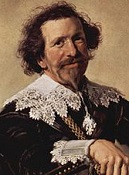


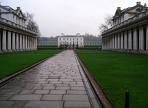
1616 A "virgin soil" smallpox or bubonic plague epidemic introduced by Maine fishermen from Europe devastates the aborigines of New England, killing up to 90% and leaving great heaps of unburied bones (until 1619); after that ends, the remaining Indians begin warring. On Feb. 16 Galileo writes a letter to Monsignor Dini, trying to clear himself of charges of heresy and blasphemy, but failing to convince the Church of the truth of Copernicanism; on Feb. 24 the Qualifiers of the Holy Office pub. a Report on the Bad Boy Galileo condemning the proposition that "the Sun is the center of the world and entirely devoid of local motion" as "foolish and absurd philosophically, and formally heretical", while the proposition that "the Earth is not the center of the world nor immovable, but moves as a whole, and also with a daily motion" is "to receive the same censure in philosophy and, as regards theological truth, to be at least erroneous in faith"; on Feb. 26 Galileo is ordered by Holy Office Commissioner Gen. Vincenzo Maculano da Firenzuola "to relinquish altogether the said opinion that the Sun is the center of the world and immovable and that the Earth moves, nor further to hold, teach or defend it in any way whatsoever, verbally or in writing"; on Mar. 3 the Congregation of the Index, headed by Cardinal Robert Bellarmine (1542-1621), without mentioning Galileo by name bans all writings which treat Copernicanism as anything but an unproven hypothesis, and prohibits Copernicus' 1543 De Revolutionibus from pub. until it is "corrected" to state that it is only presenting a hypothesis (done in 1620); the anti-Copernican decree, which is never officially ratified by the pope is not annulled until 1757; as chastened Galileo mumbles, "epur si muove" (nevertheless, it moves). On Feb. 28 after the HRE personally intervenes, Vincenz Fettmilch and six of his henchmen are arrested, beheaded, and quartered in the Frankfurt Rossmarkt (horse market), and their heads placed on iron spikes near the bridge tower, after which the expelled Jews are returned under imperial guard, and a stone imperial eagle placed over the gate to the ghetto reading "Protected by the Roman Imperial Majesty and the Holy Empire", causing pogroms to virtually cease in Germany until the rise of the Nazis in the 20th cent.; a new law sets a max of 500 Jewish families in Frankfurt, and a max of 12 marriages a year; Frankfurt Jews begin celebrating the feast of Purim Vinz on Adar 20. In Feb. William Shakespeare's and Anne Hathaway's daughter Judith Shakespeare (1585-1662) marries Thomas Quiney (1589-1663), a vintner in Stratford-upon-Avon; they have sons Shakespeare Quiney (1616-17), Richard Quiney (1617-39), and Thomas Quiney (1619-39); on Apr. 23 William Shakespeare (b. 1564) dies. On Mar. 26 after being hired by the Muscovy Co. to find the Northwest Passage, English explorers William Baffin (1584-1622) (pilot) and Robert Bylot leave Gravesend, Kent, England, pass up the Davis Strait W of Greenland, and discover ice-clogged Baffin Bay(between Nunavut, Canada and Greenland, also discovering Ellsmere Island (home of the Arctic Cordillera Mts. and the Arctic willow), Smith Sound, which later becomes a route to the North Pole, and Lancaster Sound NW of Baffin Bay (named after British East India Co. dir. Sir James Lancaster), through which the Northwest Pasage is discovered three cents. later, also sighting Devon Island in Baffin Bay, which becomes the largest uninhabited island on Earth, and reaching 77 deg. 45 min N latitude, which becomes the record until 1852 (236 years); too bad, they aren't believed until Sir John Ross rediscovers Baffin Bay in 1818, and Bylot is not given credit because he participated in the mutiny on Henry Hudson's ship in Hudson Bay in spring 1611. On Oct. 14 English playwright Samuel Daniel (b. 1562) dies, and Ben Jonson (1572-1637) becomes the first official Poet Laureate of England, attached to the royal household of James I, with an annual pension of 100 marks; the U. of Oxford makes him a Master of Arts. Bishop (since 1608), later (1622) cardinal Armand Jean du Plessis de Richelieu (1585-1642) becomes minister of state for foreign affairs and war in France, and the Richelieu Age in France begins. Prince Charles is created prince of Wales by his daddy James I. Convicted traitor Sir Walter Raleigh is released from prison on the condition that he try to discover the fabled gold mines of El Dorado along the Orinoco River and not cause any trouble with the Spanish, whom James I is partial to; he returns to Guiana with his son - and proceeds to cut his own throat? Bless my oringa? The original cigar store Indian has bodacious tatas and nice hands? John Rolfe, backed by the Virginia Co. makes a promotional trip to England to show off his English-speaking Christian wife Pocahontas (Lady Rebecca) and their infant son Thomas, and to sell the English on his tobacco and attract more capital to their venture, despite King James I's aversion to it; she and the dozen other Indians he brings are invited to visit the royal court, but Rolfe is snubbed; Pocahontas charms Queen Anne, who accedes to a letter from Capt. John Smith to receive her as Algonquian royalty, but she doesn't change the king's prejudices against ahem, Indians; she becomes the toast of the town, and sits for a mighty-white portrait by an anon. Englishman (dated Aug. 21) wearing her stiff lace collar and high hat, and holding an ostrich plume fan; Smith waits months then calls on her, and she turns her back on him for two hours before telling him that he had betrayed her people and how he had hurt her by leaving unannounced and never sending word, making her think he was dead; weeks later, she and half of the Indians come down with various fatal European diseases while aboard a ship on the Thames River bound for Jamestown, and she dies in Gravesend in Mar. 1617; Smith, who never marries finally tells his Story of Pocahantas and how she single-handedly saved him from the terrible fate of being brained in 1607, and pub. it in 1624. The Tartars of Manchu invade China (ends 1620). Venice and Austria go to war. Bavarian elector Maximilian I resigns from the 1609 Catholic League; too bad, I will follow my love wherever he will go, and he ends up rejoining in 1618. Archduke Maximilian of Tirol and Archduke Albert, gov. of the Netherlands renounce their claims to the imperial throne in favor of Ferdinand of Styria. Roman Catholic oppression in Bohemia is cranked up. The Earl of Worcester (a Catholic) is made Lord Privy Seal of England, and Sir Thomas Lake becomes secy. of state. Marco Antonio de Dominis (1560-1640), learned fatass former archbishop of Split (Spalato) in Dalmatia, whose researches have led him to break with the corrupt Roman Catholic Church flees to England, where James I gives him a big reception and puts him in the 3rd spot after the archbishops of Canterbury and York, then dean of Windsor in 1617, and he goes on to crank out anti-papal sermons and books for the British govt. Manchu leader Nurhachi (Nurhaci) is crowned as Chinese emperor Qing Tai Zu (1559-1626) - not Fu Manchu? The Swiss Guard (Gardes), a regiment of Swiss mercenaries in the French army are constituted by royal decree as part of Louis XIII's household guard; now he can keep up with the pope and his Swiss Guard (founded 1506). Dutch East India Co. merchant Pieter van den Broecke (1581-1640) smuggles arabica coffee plants out of the Yemeni port of Mocha back to Amsterdam, where they are cultivated in Amsterdam Botanical Garden; in 1658 the Dutch transport them to Ceylon, S India, Java, and Suriname, becoming the first Europeans to cultivate coffee commercially, becoming Europe's main suppliers, creating an oversupply that causes them to focus on their plantations in Java; in 1617 van den Broecke makes a drawing of a dodo on Mauritius. King James I pub. his Religious Credo. The Nanjing Missionary Case leads to the deportation of Christian missionaries in China over the practice of ancestor worship. The Collegium Musicum in Prague is founded. Architecture: Inigo Jones begins the Queen's House in Greenwich, London (finished 1635) for Queen Anne of Denmark, becoming his first major commission, and the first classical bldg. in England. Notre Dame Cathedral in Antwerp (begun 1352) is finished. The Blue Mosque (begun 1609) in Constantinople is finished; Euro visitors begin calling blue the color of Turkey, AKA turquoise. The Champs-Elysees (Champs-Élysées) (Elysian Fields) in Paris starts out as some trees planted by Marie de' Medici to create the Queen's Court from the Tuileries Palace Garden to the Place de l'Alma. Inventions: Italian physician Santorio Santorii (Sanctorius) (1561-1636) invents the first Medical Thermometer - guess where they sanctimoniously stick it? Science: English physician William Harvey (1578-1657) first reveals the function of the heart and complete circulation of the blood at the Royal College of Physicians in London, causing detractors to begin calling him "the Circulator". Italian philosopher Lucilio Vanini (1585-1619), who likes to call himself Giulio Cesare (his real name and he's just lucky?) suggests that humans evolved from apes; he is burned for it three years later - did they do the ape imitations too? Nonfiction: Johann Valentin Andreae (1586-1654), Chymische Hochzeit Christiani Rosenkreutz Anno 1459 (The Chemical Wedding of Christian Rosenkreutz in 1459 C.E.) (Strasbourg); pub. anon.; by a Wittenberg-born theologian living near Stuttgart since 1614; one of the three founding works of the Rosicrucians (1614, 1615); Duke Augustus the Younger of Brunswick-Luneburg (1579-1666), Chess, or The King's Game; pub. under alias Gustavus Selenus, introducing Selenus-type chess pieces. Sir Francis Bacon (who is suspected of being the real Shakespeare) is a Rosicrucian, as are many of Shakespeare's plays?; Andreae later claims authorship in his autobio., and calls it a "ludibrium" (lampoon). Theodore Agrippa d'Aubigne (1552-1630), Histoire Universelle (1616-18); Huguenot survey from 1553-1602, which is officially burned in Paris. Paulus Bolduanus, Bibliotheca Philosophica. George Chapman (1559-1634) (ed.), The Whole Works of Homer, Prince of Poets. Thomas Coryat (1576-1617), Greetings from the Court of the Great Mogul; his 2nd trip (1612), this time to Greece, Persia and India. Marco Antonio de Dominis (1560-1624), Consilium Profectionis (London); virulent attack on my-best-friend's-girl-she-used-to-be-mine Rome. St. Francis de Sales (1567-1622), Traite de l'Amour de Dieu. Gustavus Selenus (August von Braunschweig), Chess, or the Game of Kings. Capt. John Smith (1580-1631), A Description of New England. Lucilio Vanini (1585-1619), De Admirandis Naturae Reginae Deaeque Mortalium Arcanis (Paris); pre-certified by two doctors of the Sorbonne, then later condemned anyway. Art: Luis Tristan de Escamilla (1586-1624), Altar Image in the Church of Yepes (Toledo). Frans Hals (1580-1666), The Banquet of the Officers of St. George's Militia (Shooting) Company in Haarlem (Civic Guard of the Archers); the world's greatest portrait painter bursts onto the scene 50 before 1666? Jacob Jordaens (1593-1678), Adoration of the Shepherds. Isaac Oliver (1565-1617), Portrait of John Donne. Peter Paul Rubens (1577-1640), The Lion Hunt. Bernardo Strozzi (1581-1644), Adoration of the Shepherds (1616-8). Claus Visscher, The Globe. Plays: Gerbrand Bredero (1585-1618), Het Moortje. Ben Jonson (1572-1637), Works (Folio Ed.); the first folio ed. of its kind, setting a precedent used for Shakespeare's plays in 1623, and Beaumont and Fletcher's plays in 1647; The Devil Is An Ass (comedy). Thomas Middleton (1580-1627), The Witch (tragedy). Poetry: Theodore Agrippa d'Aubigne (1552-1630), Les Tragiques; attack on the Roman Catholic poets of the Pleiade; incl. "Les Miseres", "Les Princes", "La Chambre Doree", "Les Feux", "Les Fers, "Vengeances", "Judgment". Daniel Heinsius (1580-1655), Dutch Poems; ed. by Petrus Scriverius. Ben Jonson (1572-1637), The Forest; incl. To Celia; "Drink to me only with thine eyes/ And I will pledge with mine./ Or leave a kiss but in the cup/ and I'll not look for wine."; set to music in the 1770s as the song "Drink to Me Only with Thine Eyes". Sir Walter Raleigh (1552-1618), The Lie; "Go soul, the body's guest"; The Pilgrimage; composed in the Tower; "Give me my scallop-shell of quiet,/ My staff of faith to walk upon,/ My scrip of joy, immortal diet,/ My bottle of salvation,/ My gown of glory, hope's true gage; And thus I'll take my pilgrimage." Novels: Miguel Cervantes (1547-1616), Persiles y Segismunda. Births: Flemish mystic Antoinette Bourignon (d. 1680) on Jan. 13 in Lille; founder of Bourignianism, a school believing in direct cut-the-crap supernatural revelations, which appeals to Catholics and Protestants as a way out of their problems with fallible human orgs.? French Baroque painter Sebastien (Sébastien) Bourdon (d. 1671) on Feb. 2 in Montpellier; pupil of Claude Lorrain and Nicolas Poussin. German Baroque composer-organist-harpsichordist Johann Jakob Froberger (d. 1667) on May 19 in Stuttgart. Dutch Baroque painter Ferdinand Bol (d. 1680) on June 24 in Dordrecht; pupil of Rembrandt van Rijn. German lyric poet-dramatist Andreas Gryphius (Greif) (d. 1664) on Oct. 2 in Grossglogau, Silesia. Danish scientist Thomas Bartholin (d. 1680) on Oct. 20 in Malmo, Sweden; son of Caspar Bartholin the Elder (1585-1629); brother of Erasmus Bartholin (1625-98); father of Caspar Bartholin the Younger (1655-1738). English mathematician John Wallis (d. 1703) on Dec. 3 in Ashford, Kent; educated at Emmanuel College, Cambridge U. inventor of the infinity symbol. Scottish royalist Presbyterian nobleman William Hamilton, 2nd Duke of Hamilton (d. 1651) on Dec. 14 in Hamilton, South Lanarkshire; created earl of Lanark in 1639. English Nonformist Puritan theologian John Owen (d. 1683) in Stadhampton in Oxfordshire; educated at Queen's College, Oxford U. English "The Christian in Complete Armour" Puritan divine William Gurnall (d. 1679) in King's Lynn, Norfolk; educated at Emmanuel College, Cambridge U. Chinese Roman Catholic missionary Lu Wenzao (d. 1691); the first Chinese Catholic father and bishop. Deaths: Flemish botanist-physician Matthias de Lobel (b. 1538) on Mar. 3 in Highgate, London, England. Spanish soldier-historian Garcilaso de la Vega (b. 1539) in Cordoba. Japanese shogun Tokugawa Ieyasu (b. 1543) on June 1 (cancer) (syphilis?). English bishop Thomas Bilson (b. 1547) on June 18; buried in Westminster Abbey. Spanish "Don Quixote" writer Miguel de Cervantes Saavedra (b. 1547) on Apr. 23 in Madrid: "A bird in the hand is worth two in the bush" - same day as Shakespeare? Italian architect Vincenzo Scamozzi (b. 1548) on Aug. 7; dies after completing several projects bequeathed to him by Andrea Palladio after his 1580 death, incl. Teatro Olimpico in Vicenza. Irish leader Hugh O'Neill, 2nd Earl of Tyrone (b. 1550) on July 20 in Rome. English geographer Richard Hakluyt (b. 1552). German chemist Andreas Libavius (b. 1555) on July 25 in Coburg. French statesman-chef Guillaume Fouquet de la Varenne (b. 1560) on Dec. 7. German alchemist Andreas Libavius (b. 1560) on July 25. Italian anatomist Giulio Casserio (b. 1561). English #1 superstar poet-playwright-nomenclator ("The Bard of Avon") William Shakespeare (b. 1564) on Apr. 23 (his birthday?) (St. George's Day) in Stratford-upon-Avon, Warwickshire (fever); leaves 39 plays, 154 sonnets, two long narrative poems et al.; coined 6.7K (3K?) English words; his vocabulary was 17K-29K words, and he used 7K+ different words only once; Anglican Archdeacon Richard Davies of Lichfield, who had known him later wrote that he had been a secret (illegal) Roman Catholic; his last will and testament leaves the bulk of his estate to his daughter Susanna and her husband; leaves his "second best bed with the furniture [bedclothes]" to his wife; his lit. work isn't mentioned in his will; he is buried in the same place where he had been christened, Holy Trinity Church in Stratford-upon-Avon; a monument to him is erected above his tomb in 1623; his epitaph is "Curst be he that moves my bones", keeping him from being buried in Westminster Abbey?; his grave marker shows him holding a bag of grain, which is changed to a quill in 1747; in 2001 the Journal of Science pub. an analysis of clay pipe fragments dug up from his garden, revealing residues of marijuana, cocaine, and myristic acid; he died from mercury poisoning from treatment for syphilis? Italian scientist Lodovico delle Colombe (b. 1565). English impresario Philip Henslowe (b. 1550) on Jan. 6. English Baptist co-founder Thomas Helwys (b. 1575) in Newgate Prison. English playwright Francis Beaumont (b. 1584). Dutch mariner Jacob Le Maire (b. 1585) on Dec. 22; dies at sea en route from Batavia to Amsterdam. English-born Am. divine Alexander Whitaker (b. 1585) in Va. (drowns while crossing the James River). Japanese shogun Iyeyasu on Apr. 17.


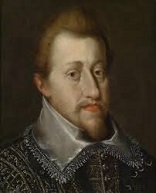









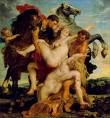

1617 The Indian Plague of 1617-18 in New England wipes out 90% of the pop., causing James I of England to give thanks to "God Almighty in his great goodness and bounty toward us" for sending "this wonderful plague among the salvages"; the Pilgrims see their chance? On Jan. 27 English academic-clergyman George Langbaine the Elder (1609-58), provost of Queen's College, Oxford U. records in his collected notes that John Shurle has a patent from Abraham Lake, bishop of Bath and Wells and vice-chancellor of Oxford U. for the position of univ. ale-tester, with the duty to visit every ale brewery in town and sample their wares, receiving a fee of 1 gal. of strong ale and 2 gal. of strong wort. In Jan. Duke Charles Emmanuel I of Savoy obtains the help of French troops to free the the town of Alba in the Piedmont from the Spanish; Louis XIII's sister Christine Marie marries the duke's son Victor Amadeus I in 1619. On Mar. 14 English recorder (since Nov. 16, 1616) Thomas Coventry is knighted and appointed solicitor gen., beginning his rise in the English judicial system. On Mar. 14 James I makes his only return to Scotland, reaching Edinburgh on May 16, being warmly welcomed by the Scots only to be told how shabby they dress and being snubbed by his English companions; he tactlessly lectures the Scottish parliament on the superiority of English civilization, then after less than 3 mo. of mainly hunting and feasting heads back by the west coast route, arriving in Windsor on Sept. 12; Queen Anne stays in England due to poor health with her momma's boy Prince Charles, which keeps him without a clue about Scotland after he becomes king - Sean Connery will get even later? On Mar. 18 after arriving in Macao on July 20, 1597 and moving to Nanjing in Mar. 1600, working with Matteo Ricco before traveling with him to Peiping on Jan. 24, 1601 and working as an astronomer to correct the Chinese calendar, Spanish Jesuit missionary Father Diego de Pantoja (Didaco Pantoia) (1571-1618) is tried in Peiping as an enemy of the Chinese astronomers and expelled, settling in Macao for the rest of his life. In Mar. 22-y.-o. Pocahontas (b. 1595) dies at Gravesend after a lingering illness before she can return to Va.; meanwhile a pestilence decimates the 30-some Wampanoag villages back on the E shore of Narragansett Bay, just in time for the Mayflower Pilgrims to move in? On Apr. 24 Concino Concini, Marquis d'Ancre (b. 1575), the Queen Regent's favorite is killed resisting arrest (assasinated?) on orders of young Louis XIII after bishop Achille de Harlay de Sancy (1581-1646), pres. of the Paris parliament plots against him. On May 27 Bavaria breaks from the Catholic League and forms its own league with Bamberg, Eichstadt, Wurzburg, and Ellwangen (until 1626). On June 5 Ferdinand of Styria (1578-1637) (later HRE Ferdinand II) becomes king of Bohemia (until Feb. 15, 1637). On Nov. 22 sultan (since 1603) Ahmed I (b. 1590) dies of typhus, and his insane brother "Mad" Mustafa I (1591-1639) becomes Ottoman sultan #15 (until 1618) after being fetched from his cage; he rules 3 mo., then in Mar. is deposed and replaced by his nephew, Ahmed I's eldest son, 14-y.-o. Osman II (1604-22) (until May 20, 1622), who becomes Ottoman sultan #16 (until 1622); too bad, he enjoys archery practice on live page boys, but he turns into an able ruler and multilingual poet, becoming the first sultan to try to get rid of the Janissaries, closing their coffee shops to stifle conspiracies, and planning on recruiting a new ethnic Turkic army; too bad, closing the coffeeshops isn't a strong enough measure, and they get wind of his plans and conspire against him bigtime. Louis XIII forces his mother Marie de' Medici into retirement and begins to rule France. The Swedish-Russian War ends with the Treaty of Stolbova, and Sweden becomes supreme ruler of the Baltic Sea; Gustavus Adolphus II recognizes Tsar Michael I, returns Novgorod, and obtains E Karelia (Carelia) and Ingria, cutting Russia off from the Baltic. Sir Francis Bacon is made Lord Keeper. Sir Walter Raleigh's expedition reaches the mouth of the Orinoco River, and burns the settlement of San Tomas, then gets pissed-off at not discovering any gold and attacks Spanish vessels carrying gold and silver from Mexico, which ends when his men mutiny - that's some bad hat Walter? The Dutch buy Goree Island (off Cape Verde) from the natives. The first English convicts are sent into servitude in the English colonies; the first church is built in Jamestown. "Stuart collars" come into fashion for men and women in Britain. Chinese Emperor Taizu places a death penalty on tobacco use in Mongolia. Francois Citois (1576-1652) records an epidemic of lead colic (colica pictonum) in Poitou. On Sept. 23 the humanist Duytsche (First Nederduytsche) Academie is founded in Amsterdam by Dutch playwright Samuel Coster (1579-1665) (until 1637). The Fruchtbringende Gesellschaft (Fruitbearing Society) lit. society is founded in Weimar by German poet Martin Optiz von Boberfeld (1597-1639) to copy the language standardization program of the Accademia della Crusca in Florence (founded 1582); in 1635 France founds their own clone. Spanish priest St. Joseph Calasanctius (1556-1648) founds the Piarists (Fathers of Pious Schools) in Rome for the education of the poor. German organist-composer Heinrich Schutz (Schütz) (1585-1672) becomes kapellmeister of the electoral chapel in Dresden (until 1672). Science: Dutch mathematician Willebrord Snell(ius) (Willebrord Snel van Royen) (1580-1626) first describes a method for surveying by triangulation, taken from ancient Greek mathematician Eratosthenes (-276 to -194); he also uses 96-sided polygons to improve the value of pi from 2 to 7 decimal places. Galileo's collaborator Benedetto Castelli uses a telescope to determine that Mizar, one of the two stars in the Big Dipper is a binary; in 1890 Mizar A is discovered to be a binary, followed in 1908 by Mizar B, followed in 2009 by Alcor, making it a sextuplet group. Nonfiction: John Calvin (1509-64), Collected Works (posth.) (Geneva). Fynes Morison (1566-1630), An Itinerary: Containing His Ten Years Travel Through the Twelve Dominions of Germany, Bohemia, Switzerland, Netherland, Denmark, Poland, Italy, Turkey, France, England, Scotland and Ireland (3 vols.); vol. 4 pub. in 1903; first mention of the term "merry Christmas". John Swetnam, The Arraignment of Women; a misogynistic pamphlet, inviting women to respond for their gender; Rachel Speght (1597-1630) responds with A Mouzell for Melastomus, the first English feminist polemic pub. under a real name? Marco Antonio de Dominis (1560-1624), De Republica Ecclesiastica; how the papacy has corrupted the Roman Catholic Church. Robert Fludd (1574-1637), Tractatus Theologo-Philosophicus; Utriusque Cosmi Maioris Salicet et Minoris Metaphysica (1617-9). John Napier (1550-1617), Rabdologia (Gr. "rabdos" = rod, staff); mechanical systems for performing arithmetic. Willebrord Snell (1580-1626), Eratosthenes Batavus; measuring the Earth using triangulation the Eratosthenes way. Art: Jacques Callot (1592-1635), The Giant Tifeo Beneath Mount Ischia (print). Domenichino (1581-1641), Diana's Hunt (1616-7). Anthony van Dyck (1599-1641), A Study of Four Negro Heads in Brussels and Malibu; not bad for an apprentice of Rubens? Guido Reni, The Deeds of Hercules (1617-21). Peter Paul Rubens (1577-1640), Rape of the Daughters of Leucippus (1617-8). Music: Jean-Baptiste Besard (1567-1618), Novus Partus. Biagio Marini (1594-1663), Musical Events (sonata for solo violin). Johann Hermann Schein (1586-1630), Banchetto Musicale (Musical Banquet); the first dance suite, containing 20 variations; listen. Plays: Gerbrand Bredero (1585-1618), De Spaansche Brabander. Pieter Hooft (1581-1647), Warenar; comedy adapted from Plautus' "Aulularia". Theophile de Viau (1590-1626), Pyramus et Thisbe (tragedy in verse); lovers in Babylon; basis of "Romeo and Juliet"? Thomas Middleton (1580-1627) and William Rowley (1585-1626), A Fair Quarrel (comedy). Novels: Anon., Chin P'ing Mei (Gold Plum Vase); first realistic social novel pub. in China. Births: English royalist antiquary-alchemist-politician (Freemason) Elias Ashmole (d. 1692) on May 23 in Lichfield, Staffordshire. French Baroque painter Eustache Lesueur (Le Sueur) (d. 1655) on Nov. 19 in Paris; great-uncle of Jean-Francois Lesueur (1760-1837). German elector Palatine Charles I Louis (d. 1680) on Dec. 22; 2nd son of "Winter King" Frederick V and Princess Elizabeth (daughter of James I of England). German poet Christian Hofmann von Hofmannswaldau (d. 1679) on Dec. 25 in Breslau, Silesia. Dutch genre painter Gerard ter Borch (Terburg) (Torborch) (d. 1681) in Dec. in Zwolle, Overjissel; son of Gerard ter Borch the Elder (1583-1662). Spanish Baroque painter Bartolome (Bartolomé) Esteban Murillo (d. 1682) in Dec. in Seville (Pilas?). English Cambridge Platonist philosopher Ralph Cudworth (d. 1688) in Aller, Somersetshire; educated at Emmanuel College, Cambridge U. Dutch painter Emanuel de Witte (d. 1692) in Alkmaar; known for his mastery of perspective and light. Italian Jesuit mathematician Paolo Casati (Paulus Casatus) (d. 1707) in Piacenza; family is from Milan. Deaths: Italian mathematician Bernardino Baldi (b. 1533) on Oct. 12 in Urbino. Scottish judge Sir John Skene (b. 1543). Italian philosopher Giovanni Botero (b. 1544). Spanish philosopher Francisco Suarez (b. 1548). Scottish mathematician John Napier (b. 1550) - the original captain's log? Croatian humanist scholar Faust Vrancic (b. 1551) on Jan. 17 in Venice. Italianu physician-botanist Prospero Alpini (b. 1553) on Feb. 6 in Padua. Italian astronomer-cartographer Giovanni Antonio Magini (b. 1555) on Feb. 11 in Bologna. French-born English miniature painter Isaac Oliver (b. 1556) on Oct. 2 in London. Austrian prince-bishop of Salzburg (1587-1612) Wolf Dietrich von Raitenau (b. 1559) on Jan. 16 in Burg Hohenwerfen (imprisoned for life). French-born English portraitist Isaac Oliver (b. 1565) in Oct. French composer Jean-Baptiste Besard (b. 1567). Japanese emperor #107 (1586-1611) Go-Yozei (b. 1572) on Sept. 25. Italian politician Concino Concini, marquis d'Ancre (b. 1575) on Apr. 24 in Paris (killed for resisting arrest) (executed by orders of Louis XIII?). English travel writer Thomas Coryat (b. 1576) in Surat, India (dysentery). Ottoman sultan (1603-17) Ahmed I (b. 1590) on Nov. 22 (typhus). Am. Indian princess "Frisky" Pocahontas (b. 1595) in Mar. in Gravesend, England at age 22.
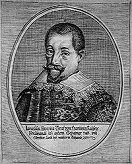
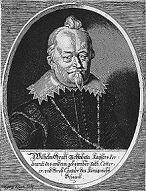
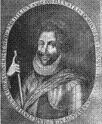









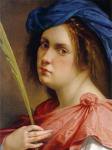

1618 On Feb. 19 the Peace of Madrid is ratified, ending the war between Venice and Austria. On May 23 Galileo Galilei sends a Letter to Archduke Leopold of Austria, along with telescopes and his treatise on sunspots. On May 23 after they can't stand the thought of fiercely Roman Catholic Ferdinand of Styria (future HRE Ferdinand II) ruling Bohemia, the Ultraquist Bohemian Revolt against the Hapsburgs, led by Count Matthias von Thurn begins with the Second Defenestration of Prague, when some Protestant rebels throw Roman Catholic regents Jaroslav Borzita (Borita) (Borsita) of Martinice (Martinic) (Martinitz) (1582-1649) and William Slawata (Schlabata) (Vilem Slavata) of Chlum (1572-1652) (members of the Bohemian royal council) from a window in Hradcany Castle in Prague into a manure pile, precipitating the cannon and gunpowder filled cool-to-be-cruel Thirty (30) Years' War (ends May 15, 1648); the Imperial Army under CIC field marshal Baron Charles Bonaventure (Karl Bonaventura) de Longueval, Count of Bucquoy (1571-1621) enters Bohemia to suppress the rebels. Oh come let us adore him, Christ the White Man's Lord? On Sept. 6-25 the Great Comet of 1618 (one of three this year) appears in the skies over Europe, causing Millennium Fever to whip up, esp. with the Puritans of Leiden, Holland, who use it as their excuse to throw caution to the wind and travel to survival-of-the-fittest North Am. to plant a godly English civilization, while the rest of the Euro Christians begin the apocalyptic super-cruel Thirty Years' War (ends 1648); in England the comet is used to diss the king's proposed marriage alliance with Spain; you had to be there, but the intoxicating power of the new King James Bible over all English Bible-thumpers actually makes them think they are the Chosen People, with a language not tracing back to Rome and Roman popery, with the butchery of the greedy Roman Catholics in South Am. proving that their brand of white is right; in 1662 Phineas Pratt writes "In the year 1618 there appeared a blazing star over Germany that made the wise men of Europe astonished there." On Nov. 13 the Synod of Dort (Dordrecht) convenes in Dordrecht to settle the differences between the Calvinists and Arminians (free-will believers), followers of Jacobus Arminius (Jako Hermanszoon) (1560-1609), and next May 9 after 154 meetings ends up expelling the Arminians from the Dutch Reformed Church. How WASP North America became a Christian nation? Prominent British MP Sir Edwin Sandys (1561-1629) becomes head of the cash-poor, land-rich Virginia Co.a nd institutes the "headright" policy, offering anybody who buys a share in the co. and comes to sandy Virginia 50 free acres, plus another 50 for any indentured servants (7-year term) he brings; this becomes a custom with proprietors in Maryland and other southern and middle colonies; the original Va. settlers got 100 acres. On Sept. 26 after the united armies of the Ottomans and Tartars are defeated by the Persians under Shah Abbas I near Sultaniyeh (140 mi. NW of Tehran), causing the Ottomans to end all squabbles over their boundaries and confirm their 1612 treaty; too bad, the Turks don't wait long to renew their war. On Oct. 29 (Thur. Old Style) after returning to England Sir Walter Raleigh (b. 1552) finds that the Spanish govt. is demanding his death, causing his 1603 death sentence to be restored; after he "tooke a pipe of tobacco a little before he went to the scaffolde", he is beheaded in the Tower for treason; henceforth he can only be found in a can - the mean old king never did like that tobacco stuff? In Oct. the Duke of Lerma is removed from power after obtaining a cardinal's hat in Mar. Richelieu is ordered into exile at Avignon for intriguing with Queen Mother Maria de' Medici. Insane Duke Albert Frederick of Prussia dies, and his possessions pass to his son-in-law John Sigmund (regent during Albert's insanity in the latter part of his reign) through marriage, and he is proclaimed duke; Brandenburg and Prussia begin fusing. Count Ernst von Mansfeld (1580-1626) occupies Pilsen for the Protestant Union. Poland signs a two-year truce with Sweden, and a 14-year truce with Turkey. After failing to get Tuscany to invade Lebanon for five years, the situation finally cools down enough for Fakhr al-Din II to return to Lebanon, and he goes on to get even with Youssif Sifa and recover his lands, and permits Jesuits and Roman Catholic nuns to open schools. James I imposes bishops on the Presbyterian church of Scotland in an attempt to integrate it with the Church of England; the move is deeply unpopular. Russia makes peace with Poland. Nurhachi makes his move, declaring war against Chinese emperor (since 1573) Ming Shen Zong and proclaiming seven grudges to Heaven, occuping Fushun and Qinghe in Liaodong, then pulling out after killing Ming gen. Zhang Chengyin and setting up a govt. with local Han Chinese assistance. Prince Philip William of Orange (b. ?) dies, and is succeeded as prince of Orange by his Roman Catholic younger brother Maurice of Nassau (1567-1625). Ferdinand of Styria becomes king of Hungary. Baron Reachea IV dies, and Chettha II becomes king of Cambodia (until 1622). The Scottish Kirk Gen. Assembly in Perth issues the Five Articles of Perth, attempting to change from the Presbyterian to Episcopalian form of org. so that James I/VI can rule the churches in England and Scotland the same way as head of the church; a civil war in the Scottish church results, which lasts until 1690; meanwhile clan war rocks the Scottish Highlands. The Moroccan army returns from the middle Niger region and Timbuktu, leaving only some garrisons in important towns; a few decades later the descendants, known as the Arma become overlords of Timbuku (until the early 19th cent.), putting down constant revolts. Lord Delaware (b. 1577) receives complains of the tyrannical actions of his Va. deputy Samuel Argall, sets sail for Va., dies on the voyage, and is buried at sea. John Tradescant the Elder (1577-1638) journeys to Russia with Sir Dudley Digges, and leaves a journal for posterity. French explorer Paul Imbert discovers Timbuktu. The Dutch West African Co. (Dutch West India Co. on the Gold Coast of West Africa) is founded. The town of Cordoba, Mexico is founded by Mexico viceroy guess who? Dutch privateer Jan Janszoon (1570-1641) from Haarlem is captured by Barbary pirates, taken to Algiers, and converts to Islam, sailing with famous Dutch-born corsair Sulayman Rais (Slemen Reis) and changing his name to Murad (Murat) Reis, operating from the port of Sale (Salé), Morocco until 1627. Playwright Ben Jonson begins a walking tour of Scotland. Anthony Van Dyck becomes a member of the Antwerp guild of painters. Puritan Separatists Edward Winslow (1595-1655) and William Brewster (1567-1644) pub. a religious tract in Leyden, Holland critical of King James I and his bishops, causing the king to order Brewster's arrest and send agents to Holland; Brewster goes into hiding, causing deacon John Carver and Robert Cushman (1577-) to become the leaders of the Separatists in negotiating with London officials to found a colony in North Am. Catherine de Vivonne, Marquise de Rambouillet (1588-1665) founds her literary salon in Paris in the rebuilt Hotel Pisani, designed with suites of small rooms for private er, talk, becoming known as the Hotel de Rambouillet, which is a main social center until 1650; meanwhile her daughter Julie Luciana d'Angennes (1607-71), AKA the Incomparable Julie is groomed to fill her slippers. Architecture: The Teatro Farnese in Parma, Italy opens. The Queen's House in Greenwich (begun 1616) is finished. Aston Hall in Birmingham, England is begun (finished 1635). Science: Garcia de Sylva Figuera, ambassador of Philip II of Spain visits Persepolis in Iran, and becomes the first to suggest that the funny wedge markings might be a lost form of writing (cuneiform) - here's some positive feedback? Nonfiction: Robert Balfour, Commentarii in Organum Logicum Aristotelis. Jakob Boehme (1575-1624), Sixty-Two Theosophic Epistles (1618-24). Martin Boehme, Ein Neu Buch von Bewehrten Rosz-Arzteneyen; veterinary manual. Johannes Buxtorf (1564-1629), Biblica Hebraica cum Paraphrase Chaldee et Commentariis Rabbinorum (2 vols.); his magnum opus; a Rabinnical Bible. King James I (1566-1625), Declaration of Sports; orders it read in all English churches to encourage healthy enjoyment of fun and games on Sunday, outraging Puritans - so that's why they call Sunday football heroes jocks? Johannes Kepler (1571-1630), Epitome Astronomia Copernicanae (The Epitome of Copernican Astronomy); a textbook on astronomy which describes it in modern terms, replacing scholastic mumbo-jumbo with observation, translation into numbers, and use of mathematical models to form hypotheses which "save the appearances" and describe the true motions of the planets and their causes, which had been hidden in "God's pandects"; those who can penetrate his shrouded Latin prose get a shock; Kepler's salary, which is paid only irregularly before the Thirty Years' War, is hardly paid at all; his mommy is charged with w itchcraft during one of the many German witch hunts, and narrowly escapes execution; meanwhile, the Catholics keep persecuting him for not worshiping images and saints, and even his fellow Lutherans in Linz exclude him from their Evening Meal because he doesn't believe in God's omnipresence; "Suffering along with many brothers for the sake of religion and for the glory of Christ by enduring harm and disgrace, by leaving one's house, fields, friends, and home, I would never have believed all of this could be so agreeable." (Kepler) Royal College of Physicians (London), Pharmacopoeia Londinensis. Johann Jakob Scheuchzer, Natural History of the Swiss Landscape. Teophilus Schweighardt Constantiens (Daniel Mogling), The Mirror of the Wisdom of the Rosicrucians (Frankfort-am-Main). John Stow and E. Howes, A Summarie of Englyshe Chronicles. Art: Giovanni Bernini (1598-1680), Aeneas, Anchises, and Ascanius (sculpture) (1618-9). Jerome Duquesnoy the Elder, Manneken Pis (Dutch "Little Pissing Man") Fountain (1619?) (bronze sculpture); becomes the symbol of Brussels; in 1965 it is switched with a replica so it can be kept safe in the city museum. Peter Paul Rubens (1577-1640), The Battle of the Amazons. Diego Velazquez (1599-1660), An Old Woman Cooking Eggs (Vieja Friendo Huevos). Music: Johann Hermann Schein (1586-1630), Opella Nova, Geistlicher Concerten. Plays: Guillen de Castro y Bellvis, Comedies (1618-21). John Fletcher (1579-1625), The Humorous Lieutenant (comedy). Births: Italian Jesuit priest-mathematician-physicist Francesco Maria Grimaldi (d. 1663) on Apr. 2. in Bologne. Swiss field marshal Henrik Horn (d. 1693) on May 22. French architect Nicolas-Francois (Le Grand) (the Great) Blondel (d. 1686) on June 15 in Ribemont?; grandfather of Jacques-Francois "Le Petit" Blondel (1705-74). Dutch Baroque portrait painter (in England) Sir Peter Lely (Pieter van der Faes) (d. 1680) on Sept. 14 in Soest, Westphalia, Prussia; moves to London in 1641; knighted in 1680; paints Charles I, Charles II, and Oliver Cromwell; introduces the mezzotint to Britain; first English painter to leave an immense body of work. Indian Mughal emperor #6 (1658-1707) (Muslim) Abul Muzaffar Muhi-ud-Din Mohammad Aurangzeb (Aurungzeb) (d. 1707) AKA Alamgir ("Universe-seizer") in Dahod; 3rd son and 6th child of Shah Jahan (1592-1666) and Mumtaz Mahal. English astronomer Jeremiah Horrocks (d. 1641). Dutch atty. (first in North Am.) (namesake of Yonkers, N.Y.) Adriaen Cornelissen "Jonkheer" ("gentleman") van der Donck (d. 1655) in Breda. English "stone walls do not a prison make" Cavalier Poet Richard Lovelace (pr. like loveless) (d. 1657) in Woolwich; educated at Gloucester Hall, Oxford; brother of Francis Lovelace (1621-75). English Quaker leader James Naylor (Nayler) (d. 1660) in Ardsley, Yorkshire. Dutch still-life painter Abraham Vosmaer (d. 1661). English "The Mistress", "The Four Ages of England" poet-essayist Abraham Cowley (d. 1667) in London; educated at Westminster School, and Trinity College, Cambridge. Dutch landscape painter Louis Elsevier (d. 1675). English "Glossographia" lexicographer (Roman Catholic) Thomas Blount (d. 1679) in Bordesley, Tardebigge, Worcestershire. French explorer Medart (Médart) Chouart de Groseilliers (d. 1696). British col. Thomas Blood (d. 1680) in County Meath, Ireland; known for his ruffianism, incl. trying to steal the crown jewels from the Tower in 1671. Japanese Confucian scholar-historian Hayashi Shunsai (d. 1680). Deaths: English benefactress Dorothy Wadham (b. 1535) on May 16 in Edge, Branscombe, Devon. Am. Indian chief Powhatan (b. 1547); father of Pocahontas. Italian "bel canto" composer-singer Giulio Caccini (b. 1551) on Dec. 10 in Florence; leaves Ave Maria, which doesn't become a hit until the 1990s. English know-it-all explorer-writer-courtier Sir Walter Raleigh (b. 1552) on Oct. 29 in London (beheaded); last words: "This is a sharp medicine, but it is a physician for all diseases and miseries", followed by "Strike, man, strike!"; his wife Bess has his head embalmed, and carries it with her the rest of her life, after which their son Carew has it buried with them in St. Margaret's Church, Westminster. Prussian duke #2 (1568-1618) Albert Frederick (b. 1553) on Aug. 28. English explorer Sir James Lancaster (b. 1554) in May. French cardinal-theologian Jacques Davy Duperron (b. 1556) on Sept. 5 in Batignolles (Paris). English poet John Davies of Hereford (b. 1565) in July. Carmelite nun Barbe Jeanne Acarie (b. 1566) on Apr. 18 in Pontoise, Ile-de-France; beatified by Pope Pius VI in 1791. Spanish Jesuit missionary Father Diego de Pantoja (b. 1571) in Jan. in Portuguese Macao, China. English dramatist George Wilkins (b. 1576). English fussbucket Thomas West, 3rd baron de la Warr (b. 1577); dies at sea en route to Va. Dutch poet-playwright Gerbrand Bredero (b. 1585).


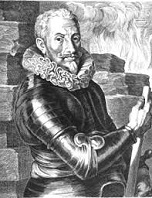




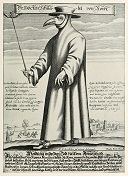

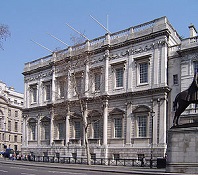
1619 Between this year and 1622 the Virginia Co. sends 3.6K settlers to Va., and only 600 survive - this time Darwin may have something? On Mar. 4 James I's Roman Catholic wife Anne of Denmark (b. 1574), queen consort of England dies, missing seeing her daughter Elizabeth Stuart become the Winter Queen. On Mar. 20 HRE Matthias (b. 1557) dies in Vienna, and on Aug. 28 after Maximilian I of Bavaria turns it down, and Johann Georg I of Saxony is talked into voting for him to nullify opposition from the other Protestant electors in return for letting him occupy Silesia and Lusatia, Roman Catholic, Jesuit-educated (strongly anti-Protestant) Austrian Hapsburg Archduke Ferdinand of Styria (king of Bohemia since 1617) is elected HRE Ferdinand II (1578-1637) (until Feb. 15, 1637); freaking at the thought of a Jesuit marshmallow-toaster running Bohemia, the Bohemian Diet (nobles) declares him deposed on Aug. 26, and elects Protestant League head Frederick (Friedrich) V (1596-1632) (elector of the Rhenish Palatinate of Bavaria since Sept. 19, 1610 and son-in-law of James I of England) as king of Bohemia in his place, and he is crowned in Prague on Nov. 4, going to war with HRE Ferdinand II and Maximilian I of Bavaria (who strikes a deal with Ferdinand in Oct. in exchange for large concessions) and the Catholic League, beginning the Bohemian Revolt of the Czech Estates (ends 1620), the first phase of the Thirty Years' War (ends May 15, 1648), the first "modern" war, and the first heavily influenced by merchants and trade; too bad, Frederick doesn't last long, becoming known as the Winter King, and his Scottish wife Elizabeth Stuart "the Queen of Hearts" as the Winter Queen; meanwhile cagey Maximilian I of Bavaria signs a neutrality treaty with the Protestant Union and occupies Upper Austria as security for his expenses; in Dec. Bavaria agrees to supply its own 7K men to the Catholic army of 21K infantry and 4K cavalry, commanded by frilly collar lover Johann Tserclaes, Count of Tilly (1559-1632), a descendant of the Roman Catholic Brabantine family; meanwhile the Protestant Union army only totals 10K men. In Mar. after Nurhachi unifies all of the Jurchen tribes except the Yehe, and attacks them, causing the Ming emperor to send reinforcments to their aid, the Battle of Sarhu sees 100K Ming troops with Korean reinforcements defeated by 10K Manchus under Nurhachi, who uses superior force concentration tactics to win with cavalry despite the Chinese having matchlocks and cannon, messing up their plans to siege Nurhachi's home base of Hetu Ala. In the spring English explorer Thomas Dermer sails S from Maine in a small boat with Squanto to return to his home at Patuxet, site of modern-day Plymouth, and finds all 2K wiped out by the plague (smallpox?) (viral hepatitis?), then takes Dermer to Nemasket, 15 mi. inland, finding several family members alive and well, then takes him to visit chief Massasoit and his brother Quadequina of the Pokanokets, and talks them into returning the French captives of 1615, then leaves Squanto to spend the winter in Va. - congratulations victor nightingale? On June 10 the Battle of Sablat (Zablati) near Prachatice sees the Roman Catholic army of Charles Bonaventure (Karel Bonaventura) de Longueval, Count of Buquoy (1571-1621) defeat the Protestant army of Count Ernst von Mansfeld, who loses 1.5K infantry plus his baggage train, causing the Bohemians under Count Georg Friedrich of Hohenloe-Neuenstein-Weikersheim (1569-1645) to lift their siege of Budejovice (Budweis), becoming a turning point for the Catholics - Budweiser joke here? In June the Puritan Separatists of Scrooby in Nottinghamshire, England secure a patent from the Virginia Co., and William Bradford sells his house to help pay for the voyage; meanwhile news arrives from Robert Cushman of London that another group of 180 English Separatists from Emden, Holland led by Mr. Blackwell had tried to reach North Am. during the winter, and all but 50 died of the "the flux, and also want of fresh water"; the Dutch get wind of their plans and offer to help them set up a Dutch settlement, and when they refuse secretly work to block them from leapfrogging into an area they want for themselves? The first blacks arrive in the future U.S. one year ahead of the Mayflower? On July 30 after economic success causes Dale's Code to be relaxed, and the Va. Co. promises settlers the "rights of Englishmen", including a rep. assembly, and new gov. Sir George Yeardley (Eardley) (Yardley) (1587-1627) arrives, the House of Burgesses, the first representative assembly in Am. (gov., six councilors, 22 burgesses elected by property owners, all male) meets in the church in Jamestown and deliberates for five days, "sweating & stewing, and battling flies and mosquitoes"; member Walter Shelley dies from the heat; they discuss Indian relations, church attendance, gambling and drunkness, and tobacco prices; the die is cast for the WASP pattern of democratic capitalism for themselves and chattel slavery for blacks?; they hold a Thanksgiving on the banks of the James River on what later becomes Berkeley Plantation, birthplace of Benjamin Harrison; having exported 10 tons of tobacco by this year, the Jamestown colonists can afford to import their first African (Negro) slaves (which are still called indentured servants?) and women, which arrive on the Treasurer and Dutch man-of-war White Lion (captained by English privateers) from Angola in late Aug.; they were originally captured in North Africa by African Muslims, who enslave 1M Euro whites from 1500-1800, and hold slave auctions in Egypt until 1885; they pay for the "20 and odd Negars" "victuale" (food), and for the 90 women brought by another English ship with 120 lbs. of tobacco for each (5 tons); the blacks are slaves captured from the Portuguese slave ship Juan Bautista en route from Angola to Veracruz (there are already 200K African slaves in the Americas); by the 1640s several of the blacks are listed as landowners, indicating they had attained freedom, but after 1640 they begin to be treated as chattel, and outnumber white indentured servants by the 1670s - by which time their ass is grass and their white owners have the lawnmowers? On Aug. 10 after Marie de' Medici runs a power play on her son Louis XIII, causing the latter to recall Richelieu from Avignon to prevent a revolt, and Louis marches his army into Angers and defeats his mother's supporters, the Treaty of Angouleme is signed, ending the conflict. On Sept. 7 Transylvanian Jesuit (St.) Melchior Grodziechi (b. 1582) and Silesian Jesuit (St.) Istvan Pongracz (b. 1584) are tortured, murdered, and mutilated and left unburied for 6 mo. by Calvinist troops of Prince George I Rakoczi in Kosice in modern-day Slovakie after they fail to renounce their faith and are framed on treason by being accused of inviting the Polish army into Kassa - they were proud of their career and excited about their future? On Nov. 10-11 (St. Martin's Day) (night) after joining the Dutch States Army in 1618, La Haye en Touraine, France-born philosopher-mathematician (Roman Catholic) (Rosicrucian) ("Father of Modern Philosophy") Rene (René) Descartes (1596-1650) has divine visions in Neuburg an der Donau, Germany in which he "discovered the foundations of a marvelous science", which later becomes Analytic Geometry, along with his famous dictum "Cogito ergo sum" (Je pense donc je suis), causing him to dedicate his life to the mathematical basis of Nature; in 1620 he leaves the army, returning to the Dutch Repub. in 1628, spending 20 years formulating his philosophical works, laying down a new direction for philosophers with an explanation of mind and matter, besting Roger Bacon and later gaining the title "Father of Modern Thought". On Dec. 23 elector (since 1608) John Sigismund (b. 1572) dies, and George William of Hohenzollern (1595-1640) becomes duke of Prussia and elector of Brandenburg (until Dec. 1, 1640). Bethlen Gabor of Transylvania invades Hungary, allies himself with Count Thurn, captures Pressburg, crosses the Danube, then retreats from Vienna. Philip III of Spain leaves his court at Madrid to visit Portugal, where he contracts a fatal illness. Edward Herbert, Lord Herbert of Chirbury (Cherbury) (1583-1648) is appointed English ambassador to France (until 1624), where he picks up Deism? The Dutch set up a whaling industry on Amsterdam Island. After deciding to turn the Dutch warehouses into a fort, and allowing the English to take the town while he's away on an expedition, Dutch East India Co. gov.-gen. Jan Pieterszoon Coen reconquers Jakarta but burns it down in the process, rebuilding it and founding Batavia (modern-day Jakarta) in Java (modern-day pop. 33.4M/10.7M), which becomes HQ of the spice-is-nice Dutch East India Co. (VOC); he tries unsuccessfully to get the town named Nieuw Hoorn after his hometown, and also tries unsuccessfully to dig canals there like in Amsterdam. The Dutch East India Co. ship Schiedam arrives in Japan, carrying French Huguenot refugee cook's mate Francois Caron (1600-73) (first Frenchman to set foot in Japan?), who goes on to learn Japanese and become their interpreter. The rest of St. Xavier's arm is cut into three pieces by the Jesuits and shipped to Macao, Cochin and Malacca; medical miracles are sure to follow. Virginia tobacco production reaches 20K lbs. this year. The Giro-Bank is founded in Hamburg to improve the "desolate state" of the currency, becoming Germany's first commercial bank. The Jamestown Colony enacts the first law in North Am. ordering farmers to grow Indian hemp (Cannabis sativa); mandatory laws are enacted in Mass. in 1631, Conn. in 1632, and the Chesapeake colonies in the 1700s; in 1631 hemp becomes legal tender in most of the British colonies until the early 1800s. Edmund Gunter becomes prof. of astronomy at Gresham College, London. Dulwich College boarding school for boys in London 4 mi. SE of St. Paul's Cathedral is founded by actor Edward Alleyn (1566-1626) as the College of God's Gift; in 1811 Sir P.F. Bourgeois bequeaths an art gallery; it goes on to become the alma mater of P.G. Wodehouse, Raymond Chandler, and (almost) Dennis Wheatley. Architecture: Francesco Borromini (1599-1667) goes to Rome to work as an asst. to Gian Lorenzo Bernini in the construction of the great canopy (baldacchino) over the main altar in St. Peter's Basilica. Inigo Jones begins the Banqueting House (Hall) in Whitehall, London (finished 1622), which goes on to become the place where Charles I is beheaded in 1649 - I do my little strut on the catwalk? Inventions: Cornelius Drebbel (1572-1633) of Holland, who had become famous throughout Europe as James I's patron in 1604 and HRE Rudolf II's patron in Prague in 1610 invents the first microscope with two convex lenses (or two lenses for that matter). Croatian-born inventor Faust Vrancic (1551-1617) tests Leonaro da Vinci's parachute design by modifying it then jumping from St. Mark's Campanile in Venice; it's just a coincidence that he soon dies? Science: William Harvey announces his discovery of the circulation of the blood at St. Bartholomew's Hospital in London. Art: Domenichino (1581-1641), Martyrdom of St. Peter the Martyr (1619-21). Charles de Lorme (1584-1678), The Doctor Schnabel von Nour; creates "the look" for a plague doctor, with beaked mask and pie-pan hat. Diego Velazquez (1599-1660), The Water-Seller of Seville; Adoration of the Kings. Music: Marco da Gagliano (1582-1643), Medoro (opera). Heinrich Schutz (1585-1672), Psalms. Jan Pieterszoon Sweelinck, Cantiones Sacrae. Nonfiction: Johann Valentin Andreae (1586-1654), Christianopoulis. John Bainbridge, An Astronomical Description of the Late Comet. Jakob Boehme (1575-1624), On the Principles of Christianity. Andre Duchesne (ed.), The Gesta Buillelmi of William of Poitiers; first-hand account of the reign of William I the Conqueror; ms. is missing the first and last folios, lost in 1731 in a fire at the Cottonian Library. Galileo Galilei (1564-1642), Discourse on Comets. Hugo Grotius (1583-1645), De Veritate Religionis Christianae. Johannes Kepler (1571-1630), Harmonices Mundi (The Harmony of the World); contains his Third Law of Planetary Motion (the squares of the periods of revolution are proportional to the cubes of the mean distances). John Pitts (Pitseus) (1560-1616), Relationum Historicarum de Rebus Anglicis Tomus Primus (De Illustribus Angliae Scriptoribus). Pietro Sarpi, Historia del Concilio Tridentino (History of the Council of Trent) (London); title page dedicated to James I; Marco de Dominis, who brought it to England pockets the royal gift? Christoph Scheiner (1575-1650), Oculus; contains the first accurate diagrams of the human eye, incl. the pupillary near-reflex, and the active nature of accommodation. Caspar Schoppe (1576-1649), Classicum Belli Sacri; calls on the Roman Catholic princes of Europe to wage war on Protestants. Francis Tregian (-1619), The FitzWilliam Virginal Book; largest ms. collection of English keyboard music from the 16th-17th cents. to survive to modern times; ends up in the possession of Robert FitzWilliam, 7th Viscount FitzWilliam (1745-1816), who donates it to Cambridge U. Plays: Honorat de Bueil (1589-1670), Les Bergeries (pastoral verse play); original title "Arthenice"; inspired by Virgil et al. Francis Beaumont (1584-1616) and John Fletcher (1579-1625), A King and No King; The Maid's Tragedy. Poetry: John Davies of Hereford (1565-1618), Wit's Bedlam. Georg Rudolf Weckherlin (1584-1653), Oden und Geseinge (2 vols.) (1618-9); dedicated to electress Elizabeth of the Palatinate; based on French Pleiade poetry. Births: Italian mathematician-cardinal Michelangelo Ricci (d. 1682) on Jan. 30 in Rome; friend of Galileo Torricelli. French Hall of Mirrors in Versailles painter ("the greatest French artist of all time" - Louis XIV) Charles Le Brun (d. 1690) on Feb. 24 in Paris; dominant artist of Louis XIV's reign; student of Simon Vouet. Dutch Cape Town cmdr. #1 (1652-62) Johan Anthoniszoon "Jan" van Riebeeck (d. 1677) on Apr. 21 in Culemborg. Dutch painter Philips Wouwerman (d. 1668) on May 24 in Haarlem; student of Frans Hals; his signature white horse appears in almost all of his 1.2K paintings, which are hard to tell apart from those of his younger brothers Pieter Wouwerman (1623-82) and Jan Wouwerman (1629-66) - big wow? Italian Baroque singer-composer Barbara Strozzi (Valle) d. 1664) on Aug. 6. French princess Anne Geneveve of Bourbon-Conde (Bourbon-Condé), Duchess of Longueville (d. 1679) on Aug. 28 in Chateau de Vincennes Prison, where her parents were put for opposing Marie de' Medici's favorite Marshal D'Ancre; only daughter of Henri II de Bourbon, prince of Conde (1588-1646) and 1st wife Charlotte-Marguerite de Montmorency (1594-1650); sister of Louis II of Bourbon, the Great Conde (1621-86) and Armand de Bourbon, prince de conti (1629-66); wife (1642-) of Henri II d'Orleans, duc de Longueville (1595-1663); lover of the duke of La Rochefoucauld (1613-80); educated in the Carmelite convent in Rue St. Jacques, Paris. French economist and statesman (minister of finance, 1661-83) Jean-Baptiste Colbert (d. 1683) on Aug. 29 in Reims; nicknamed "Le Nord" by Madame de Seveigne for his cold unemotional personality; claims to have Scottish ancestry. German poet Philipp von Zesen (d. 1689) on Oct. 8 in Priorau (near Dessau). English Civil War Parliamentarian gen. John Lambert (d. 1684) in the fall in Kirkby Malham (near Skipton), West Riding, Yorkshire. Bohemian gen.-adm.-inventor Prince Rupert, Count Palatine of the Rhine, Duke of Bavaria, Duke of Cumberland (d. 1682) on Dec. 17 in Prague; 3rd son of elector palatine Frederick V and Elizabeth Stuart (daughter of Charles I of England). French big-nosed soldier-poet Savinien Cyrano ("from Cyrene") de Bergerac (d. 1655) in Paris; subject of Edmond Rostand's 1897 drama. Chinese Confucian philosopher Wang Fuzhi (Fuchih) (d. 1692) in Hengyang, Hunan; rejects li (rational law) as existing independently of qi (chi) (matter-energy), and becomes popular for his belief that govt. should be for the people not the elite, and that landlords should be taxed. Dutch Baroque painter Willem Kalf (d. 1693) in Rotterdam. Deaths: Italian surgeon-anatomist Hieronymus Fabricius (b. 1537) on May 21 in Padua. Spanish poet Gines Perez de Hita (b. 1545). English miniature painter Nicholas Hilliard (b. 1547) on Jan. 7. English Jesuit missionary Thomas Stephens (b. 1549) in Salcete, Goa, India. English poet Samuel Daniel (b. 1552). Italian painter Lodovico Carracci (b. 1555) on Nov. 13. Bohemian king (1611-9) and HRE (1612-9) Matthias I (b. 1557) on Mar. 20 in Vienna. English poet-historian Samuel Daniel (b. 1562) on Oct. 14 in The Ridge, Beckington (near Devizes), Wiltshire. English Main Plot loser Henry Brooke, 11th baron Cobham (b. 1564) on Feb. 3 (Jan. 24 Old Style) in the Minories, London; dies in a "dingy apartment" 1 year after being released from the nearby Tower of London. English tragedian Richard Burbage (b. 1568) on Mar. 13. English-Scottish queen consort Anne of Denmark (b. 1574) on Mar. 2; her hubby James nearly dies of gastric problems after her death, caused by grief, and her son Prince Charles, who loved to go to masques with her is also freaked bigtime? Italian Roman Catholic philosopher Lucilio Vanini (b. 1585) on Feb. 9 in Toulouse (tongue cut out and burned as a heretic) - some grasses and flowers are happy with only a little water? English colonial gov. of Virginia (1611, 1614-16) Sir Thomas Dale (b. ?) on Aug. 19 in Machilipatnam (near Bantam), India.